Business
Best Business Tools and Tips Gathered from 12 Capitalist Sage Episodes [Podcast]
Published
5 years agoon
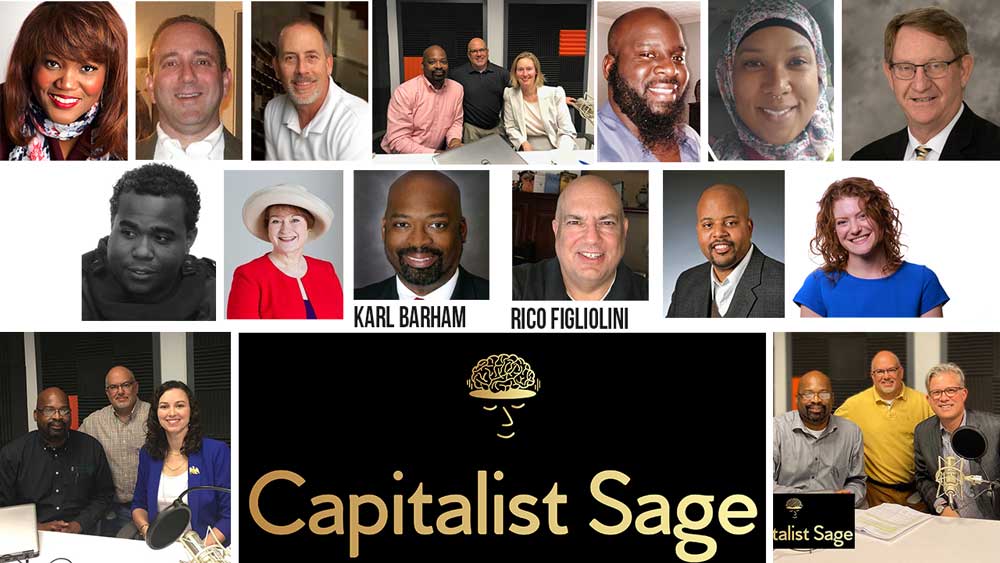
Summary:
2019 is over and 2020 is coming fast! Join Rico Figliolini and Karl Barham as they sum up all of the greatest hits from this last year of the Capitalist Sage Podcast. Gather all of the tools you need to make 2020 the best year in business.
“If there’s one thing that we tried to do in 2019 with the Capitalist Sage was bringing you people that are in the trenches doing this every day. We learned from people’s failures. We’ve learned from people’s success. But our goal is to share this information with as many people as we can and just get you thinking there’s plenty of people out there that can help you with your business.”
Karl Barham
Time Stamp:
Lines are linked to the individual episodes
[00:00:30] Intro
[00:04:21] Social Media Branding for Lead Generation with Bonnie Mauldin
[00:07:29] Wendy Kinney talking shop on effective networking
[00:10:53] What Comes After Becoming a Franchise Owner, with guest Gary Birnberg
[00:14:20] How Business Mentorship Empowers Entrepreneurs, with Erin Igleheart
[00:17:49] Cliff Bramble on How to Thrive in the Restaurant Business
[00:20:38] Top Three Mistakes People Make When Starting Their Business
[00:24:13] Going into 2020
[00:26:38] The Legal Pitfalls of Buying and Selling a Business
[00:27:28] Preparing Your Business for Exit
[00:29:26] Entrepreneurs Creating Mobile Food Events
[00:29:53] The Business Of Organic Farming
[00:30:40] Laron Walker Scaling iOT Technology from Education to Commercial
[00:31:22] Beth B Moore discussing entertainment law, emerging trends, the film and music industry
Podcast Transcript
Karl [00:00:30]: Welcome to the Capitalist Sage Podcast. We’re here to bring you advice and tips from seasoned pros and experts to help you improve your business. I’m Karl Barham with Transworld Business Advisors. My co-host is Rico Figliolini with Mighty Rockets Digital Marketing and the publisher of the Peachtree Corners Magazine. Hey Rico, how’re you doing today?
Rico [00:00:47]: Good Karl.
Karl [00:00:49]: Well today, we’re having a bonus episode where we’re getting to talk about some of the sage advice we learned over the 20, 26 plus episodes in 2019. All the guests that came by and shared some of their knowledge that’s helping business owners. So we just wanted to give, just discuss some of those that we thought were particularly impactful and talk a little bit about how they impacted our businesses and how they can impact your business in 2020. Before we get started, why don’t we talk about our sponsors for today.
Rico [00:01:29]: Right. We are here at Atlanta Tech Park in the City of Peachtree Corners. It’s an accelerator. It’s a huge place. It’s where you, because where you start off at after you’re at an incubator. Small businesses, think we-work-share hits Silicon Valley. It’s that type of atmosphere where you can meet Venture capitalists, learn from others, network, the variety of things going on here. And we’re on this road in Technology Park that’s called Curiosity Lab at Peachtree Corners, which is the autonomous vehicle track, the only one of its kind really in the United States. That I can say to us about where you can come as a company. That’s either an IOT or the does anything with autonomous vehicles that need to 5G with Sprint 5G is in this whole area of technology park, right? So anything that you want to test out on the mobile track or within the environment of Curiosity Lab so it doesn’t have to be necessary in a vehicle to be on a light post to be on someone walking to be a bicycle riding can do anything where technology needs to talk to each other to everything. It’s an atmosphere where the city of History Corners is providing it essentially free to companies that meet certain requirements to be able to come here and do business and check out there to work their real projects.
Karl [00:02:55]: It’s one of the great things about the Investments that are being made in Gwinnett County. In Peachtree Corners in particular and the whole general Southwest Gwinnett that’s bringing companies, technologies, to make this vibrant environment where businesses can thrive. And that’s a little bit why we thought it’d be great to talk about some of the guests at help shared some of their expertise and insight and experiences on how they created small businesses and how they help support small businesses being successful. So Rico and l will talk about a couple of episodes and what we learned about them and share that with you and you can of course go and check out any of these episodes on any one of our streaming platforms.
Rico [00:03:43]: Whether it’s iTunes or iHeart Radio, just look up Capitalist Sage on any of those and you should be able to find us.
Karl [00:3:49]: And if you want to keep up with some of the great episodes we’re going to do in 2020, definitely follow them, subscribe to them and please leave a comment and then we’d love to hear back from what people are thinking and give us an idea of the future guests.
Rico [00:04:03]: And if you want to watch the Facebook live stream or tell your friends, you could just like our Peachtree Corners Life page and it will be notified when we go live. In this year, one of the goals is to be able to put us on to do some limited LinkedIn live feeds and also to be on YouTube live as well.
Karl [00:04:21]: Fabulous. So we’re going to start off, when we started one of our first guests we had was Bonnie Mauldin from The Mauldin Group who talked to us about how small business owners can use social media marketing as part of their overall marketing and sales strategy in their in their business. And she shared a lot of great tips. One in particular that I know that I found interesting was the different platforms whether you’re on LinkedIn or Facebook or YouTube, Instagram, Pinterest and others all serve different functions. They target a different audience and they have different features about them and knowing and understanding the right platform for your business is one of the key things.
Rico [00:05:10]: If you’re doing business to business, obviously at that one of her things were was LinkedIn with was the place to be. And if you doing consumer, Facebook, Instagram. I think we talked a little bit even about, maybe not Tick Tock, but some of the other software online social platforms out there. But every business has a demographic and market.
Karl [00:05:34]: Absolutely. And the other thing we took away from it where in the past you might have think it was an option for your small business. It’s no longer an option. If you know of anyone that has a mobile device, they’re probably communicating and getting information from their social media platform. And so it becomes really important to have really compelling stories being told through those platforms. So instead of advertising and promoting a product, we talked a lot about storytelling on information you’re sharing about problems or things that your customers want to know that would lead them to your site. They’re going to know it’s you when they come and visit it but really telling them about the problems and the choices they’re making and being more educational and teaching them is a key attribute of really good successful social media strategies.
Rico [00:06:30]: Right. Whether you’re using it as a behind-the-scenes tool where you showing what’s going on in your office or something. Or whether you’re giving tips on how to use a certain product, those were the things.
Karl [00:06:43]: Absolutely. And the last thing to note on that is definitely include a call to action. Once you get those people looking at your site and following you and you’re sharing information. They want to know what to do next. How to get more information. How to reach you, even how to make a purchase. So including a call to action on all your social media. Now some of you may be able to do this yourselves if you have the time, but if you don’t its really important that
you have a discussion with someone and seek out professionals that can help you with your social media strategy in your business and it’s really imperative for people that are looking to grow their business in 2020 to develop some strategy and invested social media,
Rico [00:07:23]: And be consistent in it and make sure you’re there. because if you’re not there your competition will be there.
Karl: [00:07:28] Absolutely.
Rico: [00:07:29] The next one in line was Wendy Kinney she talked about how referrals are different from sales.
Karl [00:07:36]: Absolutely. Effective networking, many people probably have the experience, I know I have, of going to networking meeting. It could be a local chamber. It could be a non-profit group, an industry group and passing out a lot of business cards in wondering why you’re not getting more business and referrals from them. And what was really great that Wendy was able to share, she’s a relationship marketing expert, she told us about the differences between a sales approach and how referrals are generated. And one of those differences is started with the timelines between the two being different. A sale is typically between someone selling and someone buying and it’s a direct line of communication and pretty often the impact of that is immediate either; Yes, they’re going to buy what you’re selling or no, they’re not. Referrals have a different timeline. They happen through a third person. So the sale that typically happen doesn’t happen until first a connection is made between the person that’s selling and the person that’s referring and you do that’s built around credibility that’s established getting to know the person and trusting with the person and really understanding what they’re doing. But that second person, the person that’s making referral, then is approaching their contact base. And when they give a referral to how you can help them by you educating that individual on what you do and how you do it and how you’re doing it differently. They have the ability to identify that need in other people and therefore pass on a referral that’s extremely credible because they know you and therefore would lead back to business for the originator.
Rico [00:09:21]: You know know what I liked out of that conversation was really clear to me that you don’t have to be going to BNI necessarily or any of the other networking groups, but you should be going to somewhere. To some organization whether it’s a Business Association, a chamber, a professional association. The whole idea is we go back to consistency like social media you have to be consistent same thing with that right, you have to be at those meetings on a regular basis.
Karl [00:09:48]: We recommend three types of associations. There’s over 21 different from anywhere from alumni groups from your colleges. It could be team sport. But in any one of the things that’s being consistent and establishing and getting to learn about the people that you’re referring so that you can refer them with confidence and understand what it is that they do that can help your clients. And the last thing that she mentioned that I thought was extremely
insightful that changes the way you think about it, is the first one that speaks about price wins. In most traditional sales approaches, you’re taught to talk about value first and price later. But in referral It’s important that the person the intermediary the person that’s, that you’re talking to that’s generating referral. We call them gate openers that they have to understand what your cost structure is. They have to understand the price so they could set the expectation with the client. So lots of great, great insights from Wendy and talking about effective relationship marketing through networking.
Rico [00:10:52]: Excellent Episode.
Karl [00:10:53]: The third one was Gary Birnberg and Gary had an interesting journey in this career from working in Corporate America to franchise ownership, so he told us a little bit about how he got into franchising and was able to develop that.
Rico [00:11:10]: He went to, he originally thought well while he was in college, he thought he could do this right. He thought he went to Subway has he thought that was great. It was great franchise. He needed an investment. He and everyone told him you were going to college. What are you going to do? And he thought no, no I can handle it. Don’t worry about it, but Subways was what he thought he wanted to do essentially a franchise of that nature systematic the process was what he was interested in. So then he ended up as he got older and did some other things he ended up going back to that idea.
Karl [00:11:44]: Absolutely. And later on he invested in another sandwich franchise Which Wich and what was interesting in his story is how he started with just one and he was able to build and acquire up to seven of them at a time. And most of that time he was actually working.
Rico [00:12:01] Actually eight stores.
Karl [00:12:02] Eight stores. He was actually working for the first four before he left Corporate America and went full time into that.
Rico [00:12:11]: Right so working, he was actually working in Corporate America for, till they got the fourth store because that was the agreement he made with his wife who was his partner also I understand. Because they want to make sure that health insurance and what they’re also be risk averse. Yeah, so imagine working for corporate America and owning four of these stores now by the time we got to that fourth one, he was like I think we’re ready.
Karl [00:12:37]: Yep and be able to jump off and he followed the full journey till it’s, till its end where he successfully was able to exit all eight of the stores.
Rico [00:12:48]: Yeah, and he ended up actually when he when they got to the end of the fourth store, they opened the other four stores within seven to nine months after.
Karl [00:13:00]: And we learned when you’re looking into any business especially ones that are franchise, driving processes was really the key of the way he was able to scale so quickly so quickly. Learning how to acquire stores, learning how to run stores, learning how to manage personnel, staff, budgets, payroll. He learned all of that, that help them be very successful.
Rico [00:13:21]: Yeah, and the process allowed him a cash flow and he expanded those extra four stores at the Talon out of the eight through cash flow.
Karl [00:13:28]: Yeah he did not have to take additional loans to do that.
Rico [00:13:31]: Now and he paid off his loans also as he went because the other ones were spare loans for those stores and it was a process.
Karl [00:13:37]: Absolutely. So it shows that it can be done with a really good plan and being able to drive and follow a process. If you’re going down that path of Entrepreneurship, you don’t have to start from scratch. There’s franchises out there that can help people be their own boss, but have a support of a network. Of the business model that it’s already been proven to work.
Rico [00:14:02]: The fun part for me was when I first met him was with his first store at The Forum here in Peachtree Corners. It was the only store he had and his plan was to open one a year until he had like 10 almost and he worked his plan. I mean that was he was systematic and he worked it.
Karl [00:14:20]: Absolutely. We also had the pleasure to talk to some folks that work in the nonprofit sector over the past year. And one of our guests that we’re so thankful for was Erin Igleheart who is a program manager with the Start Me Program Atlanta associated with Emory University and several other partners whose goal and focus was bringing entrepreneurship to underserved areas of Metro Atlanta. And the being associated with the university, they had some very smart people investigating what are some of the challenges a small micro business has faced to start and be successful. And they summed it into three main components of their finding which they’ve addressed through a startup bootcamp that the program does. The first one is access to Capital. That may seem obvious, getting Capital to start a business is really important but being prepared to get that Capital whether it’s through developing a sound business plan, which they also address through delivering knowledge to these entrepreneurs. Helping them with the business plan, who to talk to, how to understand the financials of their business, is a key knowledge area that they found was a challenge. But the thing that I thought that might have been under appreciated for a lot of small business owners was the aspect of networking. The mentors that they bring to bear with the entrepreneurs creates this powerful networks. It’s not only each cohort that comes through the program. They’ve had over 200 entrepreneurs launch through the program. They’ve established a huge network between them and the mentors that continually help them grow and improve their business over time. They can boast over 75% success rate with businesses that have gone through the program, which is much higher than the average for most small businesses.
Rico [00:16:27 ]: Oh my god yeah, most small businesses failed during the first three, four years and then the majority of them do that.
Karl [00:16:34]: And when you look back as to why they probably didn’t get the right mentorship. They didn’t have people that have gone down the path and made the mistakes that they’re making to help advise them. But also those mentors help hold them accountable if they say they’re going to do something, having a sit-down with somebody who has your best interest at heart and check in on you is a powerful tool that they use as part of this Start Me Program.
Rico [00:16:58]: And you know what I like, before we got on we were reviewing what we were going to be discussing and I remembered you saying it was a bit like Shark Tank. Right because you have networking available as well. You know, and in Shark Tank, you know, all of them had money it wasn’t the money. It was really the network, the people they had, the contacts.
Karl [00:17:19]: The knowledge and the connections that they could make to the community. So a really good reminder of finding mentors that you can work with that help guide you when you’re starting up and growing your business.
Rico [00:17:34]: I say shark tank, but it really is a much more friendlier route.
Karl [00:17:40]: Yeah, absolutely and we were blessed to have some of those entrepreneurs on other episodes as well. So that was great.
Rico [00:17:49]: So the next one that we had, a guest from the restaurant industry, food industry Cliff Bramble owner of Noble Fin and Hungry Hospitality. Which is a consulting company for restaurants. And I don’t know, to me you know, there were several things. I learned quite a few things actually. Cliff is very much into the food industry, but he always he through the conversations we had over that hour we discussed how it is a business regardless. Forget about the food part of it, business is a business is a business. And what drives business what’s the biggest thing in business is labor. Is those surprises that you get so labor was a big part that he discussed on how we handle the front and the back of the house.
Karl [00:18:37]: Understanding the numbers in the business, understanding sales and marketing and how that integrates to build your Revenue stream for the business is extremely important. But a lot of people want to go into the restaurant business it’s probably the number one request that we see from buyers. They want to do restaurant. But really it’s a tough business tough industry. You can be wildly successful, but you have to be able to run it like a business know your numbers know your input costs and really know how to Market, figure out who your customer is and how to how to do a good job satisfying them.
Rico [00:19:16]: Right and he even talked about like down to the nitty-gritty, the weeds of if you’re going to buy a restaurant. You know, what’s the important part? Well to him the important
part was the amount of covers how many people actually come in. Not necessarily the sales but how much turnover of those tables. That and also discussed a little bit about retention. How do you retain employees in that environment?
Karl [00:19:39]: Absolutely. High turnover industry, but driving a culture and training and having really good systems in place to train and develop people is one of the success factors that he identify for anybody out there that’s in the restaurant or thinking of being in the restaurant industry.
Rico [00:19:55]: And even more than when it comes to you know, if you’re a manufacturer of product if the products bad you can return it right? Food, if food is bad, you can’t quite return it the same way. You either get sick maybe. And so, you know, we discussed a little bit about the romaine lettuce callbacks ever happened through all of last year.
Karl [00:20:14]: And how do you react and how do you adapt to that to the menu items and really understand your supply base to support your business?
Rico [00:20:22]: And then the last thing I think also was for competition. Different from other places because restaurants, you would think it would be other restaurants competing into somebody. But he was also saying No, no, no, I compete against also Netflix, people want to stay home.
Karl [00:20:38]: You know gaming anything that draws entertainment time away and disposable income is a competitor to you know, a restaurant especially in the fine dining space. Our next guest or episode we wanted to talk about was the Small Business Development Center SBDC associated with University of Georgia and Glenn Kruse who came by and was sharing a valuable resource to the business community that exists here. The Small Business Development Center has offices all over Georgia. They’re affiliated with the university. So Georgia State University of Georgia, Kennesaw University and many others and they provide guidance and coaching to people looking to start business inclusive of developing a plan it. So really quickly some of the lessons that we shared, the first one being around having a plan. And the number one thing that he found that people that struggled with being successful in business was a failure to plan. They did not take the time to develop one a business plan that’s inclusive of a financial plan, a sales plan. And you would think why do I need this piece of paper what I’m going out there to run a business, but it’s really the process of planning that helps you identify some of the gaps. When are you going to need cash? How much cash are you going to need to be able to run the business successfully. Also there’s a lot that goes into understanding your competitors and the SBDC has tools available to them to help you understand your demographics of an area, the market, the competition so you can build a robust plan for not only the lenders that you might need to start your business, but also potential investors.
Rico [00:22:30]: Or even involving the idea that you had because now with those armed with that information I realized wow, maybe this isn’t quite where I need to be you may be able to adjust.
Karl [00:22:40]: Absolutely. Pivoting and knowing when to pivot in your business is another critical factor of success. But if you’re not constantly scanning the environment and understanding the threats, you may miss the opportunity to make a change before it’s too late for your business. But the last point that he mentioned was all about people. Hiring the right people onboarding them and developing them. Many businesses struggle and fail when they’re not able to find and keep and retain really good, especially if you’re in a service business, if you don’t understand if you’re in a service business, it’s about the people that you probably can’t be successful in it. And really exploring in your plans how are you going to attract and retain people from a compensation standpoint, from recruiting the right people, how do you identify what those people are? But all of those things are things that anybody in business start thinking about starting a business can get help with with the SBDC that’s located. You can go online and look up the Small Business Development Center in your area and schedule a time with any one of the Consultants. The number one thing you should know about them free service for people here. It’s paid by your tax dollars and the SBA grants from the SBA the Small Business Association for a part of the US government to help provide this to drive economic developments in communities. So free service to reach out to them and get that Consulting help if you need it.
Rico [00:24:13]: So where we’re at, close to the end of our time together, but I think we wanted to hit on certainly going into 2020 what we’ve learned.
Karl [00:24:23]: Absolutely. Absolutely.
Rico [00:24:25]: So I know what I’ve learned, but do you want to start?
Karl [00:24:28]: Sure thing. One of the things that I know that I took from last year was this emergence of social media and social media marketing and incorporating into your business. And I work in a traditional industry that helps business owners exit their business and a lot of the traditional marketing methods were, you know, meeting people face-to-face and people marketing and so on. But integrating Social media into that, posting on the right platform, forming relationships with your clients and prospects. I found to be really really effective way and I can say that throughout the year seen really great success and return on that investment in time and money into building out a social media strategy. For anyone that’s thinking about dabbling in it. You can absolutely do it yourself. You could get courses on it and learn and educate yourself, but if you don’t feel you have time to do that reach out to some of the many experts in that, that’s out there including Rico who can help many people with that and just have a conversation about how they could be more effective in bringing social media into their marketing mix.
Rico [00:25:44]: So even I’ve learned a bit from our guests because you always pick up these tidbits about social media, but because I’m in that business, I’d rather skew to something else I learned that I really, you know, I sort of knew but, you know getting to know Karl better, through the show, through this past year and doing these shows and offline. I learned a little bit more about what you want to do with your business? And that everyone, you know, you start a business is you’re passionate about you want to do it. Where are you going to go with it? How you going to expand it? Those are all good things to think about but then no one really thinks about the end result. Let’s not call it the end. But where do you want to take it at some point? What’s your exit plan? Do you want to retire? Do you want to get out of it do you want to downsize a little bit from what you’re doing? And I learned from Karl quite a bit about what I should be thinking about ahead of time and also from a recent guest that we had on as well. We had Corrie Thrasher that taught us a bit about the pitfalls of selling and buying a business. So what I learned from that was pretty much, you know positioning your company because different companies that do handle differently, right? And if you’re a small business like own a family restaurant or you have a small business of consulting and you’re the person that’s running it. It’s a different value and that value extend further when you sell it if you have a magazine like I do that magazine has it that with this an asset that but if you’re doing freelance work, which is also what I do. How’s that freelance work, that gig economy if you will, how is that value as a business? If I’m gone does that mean that business goes? So I Learned a lot between you and Corrie and a few other guests.
Karl [00:27:28]: Absolutely. David Wood came in and talked about financing and how to get your financial statements in there. And if there’s one thing going into 2020 that everyone should treat themselves to is to just think about their, take a step back, get an advisor or coach or someone that’s not working for you ideally, because you want someone that can give you honest feedback. And take a critical look at your business. Look at the financials see what other people would think about. Get evaluation done for your business and find out those gaps and weaknesses sooner than later when you are planning to exit the business or when you have time to do something and make those corrections and fixes sooner on.
Rico [00:28:14]: Like anything else in life, if you don’t plan ahead you’re going to get hurt later. So selling a business does not come, oh I want to sell it in a month. It doesn’t work that way. You need to plan this out a year or two years ahead to make sure that what your business is showing. And the way it’s budgeted and all that increases the value of your business. And that’s the value I find in when I speak to Karl about things like this. He points things out that I haven’t thought about now because my mind’s not there and certainly I may not have thought about even if my mind ended up there. But you do need to clean these things out and it’s more than a month or two. We really need to look at it forever.
Karl [00:28:52]: If there’s one thing that we tried to do in 2019 with the Capitalist Sage was bringing you people that are in the trenches doing this every day. We learned from people’s failures. We’ve learned from people’s success. But our goal is to share this information with as many people as we can and just get you thinking there’s plenty of people out there that can help
you with your business. But we want to make sure you at least get some information to help you think differently about your business so you can drive those improvements in 2020.
Rico [00:29:26]: You know, and you should also look at go back to our episodes and look forward to 2020 because we have really interesting guests that we didn’t cover here necessarily. Like Lentz Pean of Food Trucks Unlimited, just talking to him and just knowing about how other businesses operate to me is exciting because you sort of pick up little things that might help you in your business. And Micole and Musa, organic farming.
Karl [00:29:53]: The organic farming, zero chemical organic farming right here in the Metro, Atlanta. How scientists, two science educated individuals built the business using proven techniques to produce higher yields of organic vegetables using non, without using chemicals or any additives to their foods and they’re building a business for the family from that.
Rico [00:30:23]: So you think of organic farming but we were able to get into the weeds, so to speak, and to the Entomology and bug aspect of it and learned quite a bit about it. Which you know, I think went beyond just knowing about organic farming also understanding people’s passions in business.
Karl [00:30:40]: And how they were able to merge that. We’ve seen that in quite a few people, Laron Walker and technology and stem education, merging that with building IOT Technologies and teaching the high schooler’s how to code and program this stuff to fill the pipeline of technical talent we’re going to need over the next 20-30 years to do this. And so many great talented people here in the community that we were able to talk to. But in 2020 we’re going to continue our journey and we’re going to continue to find and bring you more great guests that come in and talk. One of the areas that I know I’m excited to get more into is the entertainment business. We had Beth Moore an entertainment attorney attorney that came and talked to us about protecting your creative content that you create. Whether it’s music, it could be stuff that you do on YouTube, even those crazy cat videos is content that you can have copyrighted and you can get paid if you join the right association with that. And as Georgia continues to explode with film, music, even advertising industry is becoming really large here. Lots of opportunity for business people, creative people to become smarter business people and build a business around it.
Rico [00:32:02]: All the peripheral businesses that come I mean, that’s why Walking Dead that’s when we became the Hollywood East of the industry. Because you have electricians, woodworkers, prop makers.
Karl [00:32:15]: Costume designers, artists that are there. But it’s really important to figure out how to protect your content so that you can you can monetize it. So 2020 one of the things that I want to explore more and going to find more business owners that are in this entertainment. I hear I know gaming is on my list of finding some folks that are in Esport businesses that are
growing in popularity. Everything from artistic, music, creative producers. All of these businesses are just absolutely fascinating to understand the business side of that industry.
Rico [00:32:54]: So that’s one and that’s a big part of a thing I’m interested totally in that and learning a bit more about the entertainment industry. But also I think we’re going to be looking at makers as well. That’s a word phrase that’s being used for people that create, Artisans that create product within their own backyard if you will or garage or basement as it might be. And they’re creating products that are being sold on places like Etsy, online e-commerce sites, Amazon, a variety of places. It’s taking the gig economy on Acceleration because you could be making quite a bit of money and being a neighborhood that no one’s even aware that you’re there.
Karl [00:33:36]: Absolutely. I love how things come full circle from mass production assembly line and things are now becoming popular where people are building and using their talents to build things as home based businesses, but with the immersion of e-commerce and shipping and logistics, someone could make a business from their home and be quite profitable and successful. It’s one of the most popular businesses we get requests for people looking to buy business are home base e-commerce businesses. And if your maker and you’re able to make things, find creative ways to make things extremely great industry to be in and in the future. So we’re going to look to talk to some more people that are doing that as well.
Rico [00:34:21]: And if you have any suggestions, you know, feel free to first off if you’re listening to this on iTunes or any of the podcast sites, leave a review give us whatever that review might be two stars, five stars any review is a good review because this way people will be more easily find out. But feel free to suggest topics or companies or individuals that might be interesting that we could get good sage advice and be able to share that with our listeners and viewers.
Karl [00:34:53]: So as 2020 is starting off this year. We just want to thank all of our guests that have joined us on this journey and shared their wisdom. There’s more to come in 2020. We’re really excited to be able to host a podcast here at Atlanta Tech Park, a great location for not only just podcasting but just interacting with the economic engine for this part of the county Peachtree Corners from technology, to Beauty, to food all of these different types of businesses is what form this community. And so we’re just blessed to have the support of the local business Community here. All the Chamber of the Southwest Chamber of Commerce the Peachtree Corners Business Association and many others have been great partners and guests on our podcast. And we want to make sure that we are responsive to the business Community that’s here and that they have information that’s targeted for them and that can help them improve their business. So with that I’m Karl Barham with TransWorld Business Advisors of Atlanta Peachtree. Our business advisors are available to consult with you on your business, help you figure out strategies to grow, increase the value of the business. And at this time of year when you start making goals and so on, it’s a great time to chat with someone about what your plan is for your business, your exit plan, how you want to increase the value. We consult with our
business owners in the community and help them with that and if they’re ready to sell the business or ready to buy we can help them with that as well. So I can be reached at www.TWorld.com/AtlantaPeachtree or you can email me at KBarham@T world.com if we could ever help.
Rico [00:36:49]: And my name is Rico Figliolini, I do several things. I’m the publisher of Peachtree Corners magazine. Feel free to find that publication in print anywhere in the City and if you live in the city you should be getting it in your mailbox. We hit every household. Otherwise, feel free to go online at LivingInPeachtreeCorners.com and you can find our digital Edition there along with weekly postings, daily postings of things going on in this city. You’ll also find our podcast listings there, both for Capitalist Sage, Peachtree Corners Life and Prime Lunchtime with the City Manager, along with the Ed Hour which is an educational podcast that we do. And you can go MightyRockets.com, I do video projects, social media content work, anything along the digital and online area that needs to be done in a consistent fashion. I can help you there.
Karl [00:37:43]: Okay, well, I just want to thank everybody again and have a Happy New Year for everybody and thank you for joining us on this bonus episode. Thank you, of the Capitalist Sage.
Related
Business
The Forum Gives Sneak Peek of New Eateries and Community Spaces
Published
2 days agoon
July 24, 2024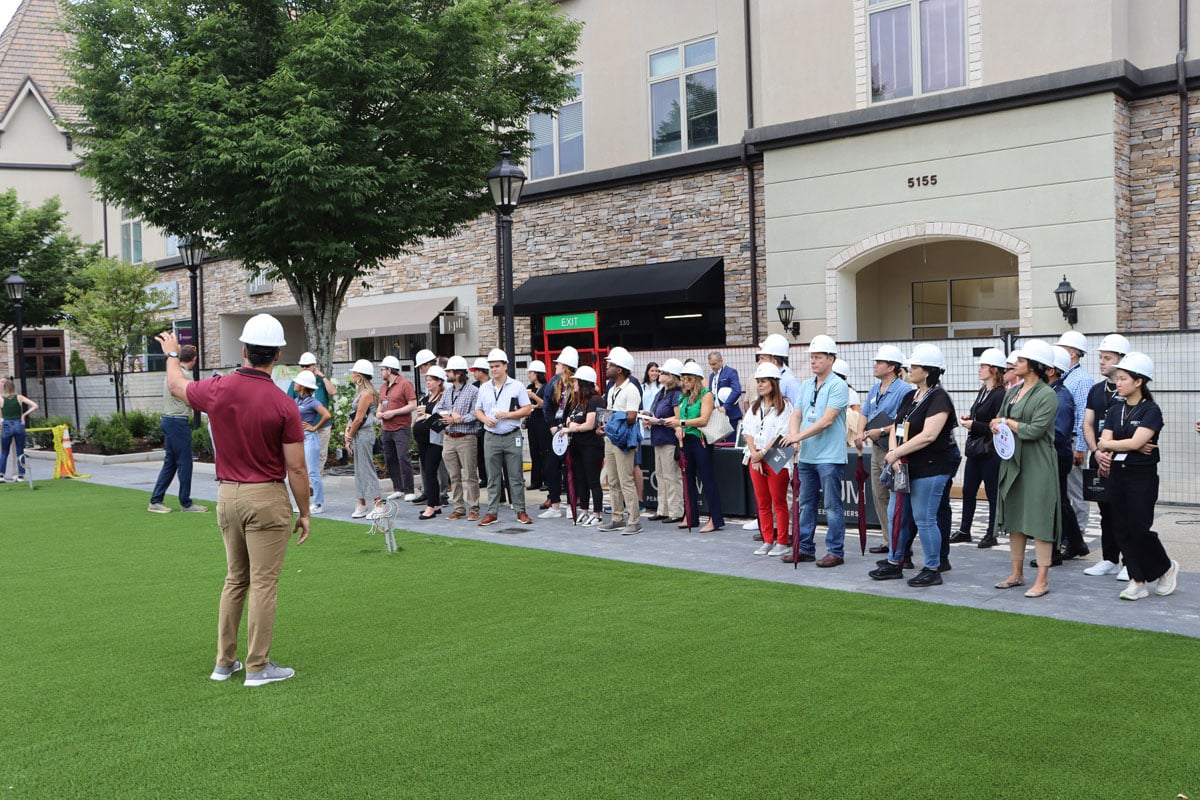
If you’ve been to or near the Forum in the past few months, you’ve probably noticed cranes and construction crews. The anticipation of the first phase of renovation of the 22-year-old retail center has left a lot of Peachtree Corners residents as well as nearby patrons excited to see changes.
The Forum administration invited the media for a hard hat tour on July 17. The event showcased the redevelopment progress ahead of The Plaza’s grand opening on Aug. 8.
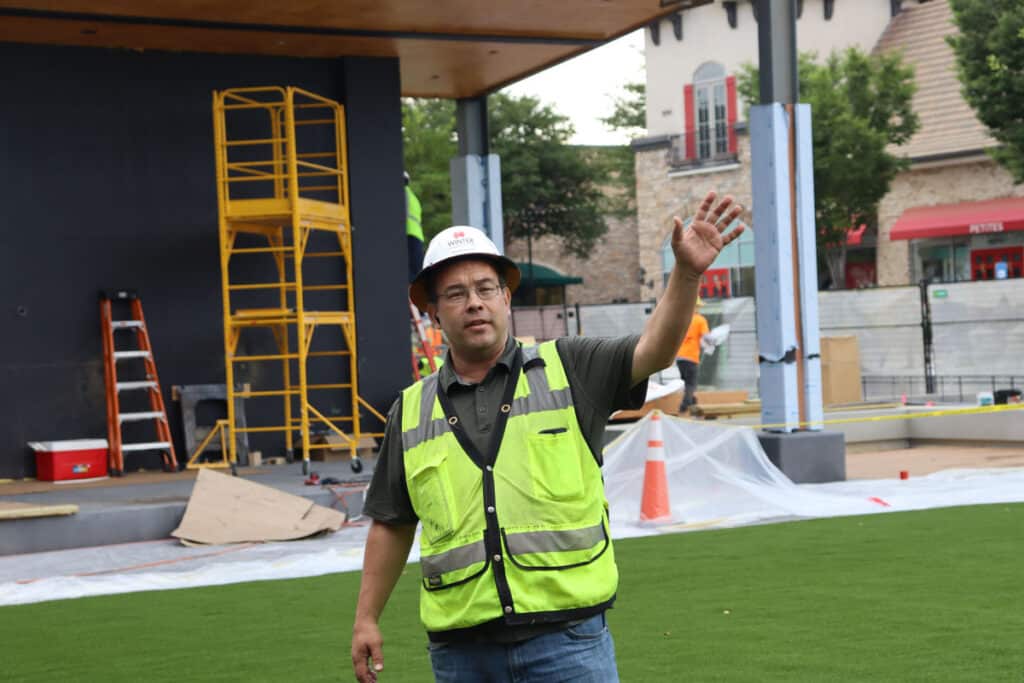
Scrumptious bites incoming
Executives from the development and leasing teams joined on-site management and led attendees around the new central gathering space, guest amenities and Politan Row, the newly created 10,000-square-foot food hall.
Dining concepts from veterans at Sheesh, Twenty-Six Thai and newbie Gekko Kitchen were the first food vendors announced for the space, which is expected to open in January.
“We can’t wait to introduce the Peachtree Corners community to our food hall experience,” said Politan Group CEO Will Donaldson in a news release. “Every detail from the design to the bar program to the cuisine is thoughtfully curated to inspire guests to not only mingle with one another but to connect with our incredible restaurateurs and discover new favorites.”
During the tour, Donaldson explained that eventually there will be seven different global cuisines in the Politan Row food court at the Forum featuring well-known and up-and-coming local talent. Once complete there will be a central bar, a private event venue and a covered outdoor patio.
“One of the things that we’re excited about is this unique design that we’ve come up with, that’s very specific to this area,” he said. “We’ll be open seven days a week for lunch and dinner. Whether you’re with a group for lunch or with your family, it works great for multiple settings.”
Twenty-six Thai owner Niki Pattharakositkul said the restaurant will work with local vendors to source the freshest meats and produce possible.
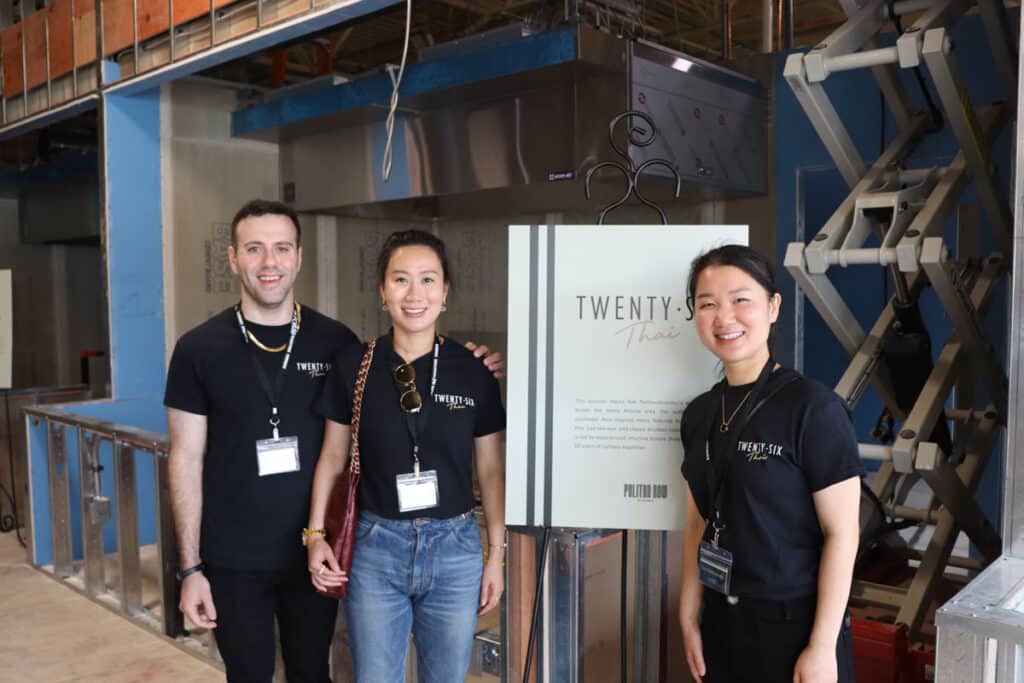
“There are certain types of produce and protein we try to source locally, but sauces and the more exotic produce and herbs, we have to import from Thailand,” she said. “Our brand is trying to move towards doing things locally and sustainably.”
Working with organizations such as Georgia Grown limits the use of large food distribution companies. Since starting Twenty-six Thai in 2016, Pattharakositkul has launched seven locations across metro Atlanta, including at Politan Row’s Ashford Lane and Colony Square.
The eatery describes itself as an “authentic wok-fired Southeast Asia-inspired menu featuring items such as pad Thai, pad see ewe and classic drunken noodles.”
Sheesh, a Mediterranean concept that uses simple, wholesome ingredients prepared with unique spices and blends, is run by corporate executive chef Charlie Sunyapong and director of operations Raquel Stalcup. The two are also members of the group behind full-service restaurants Stäge at Town Center and Pêche at the Forum.
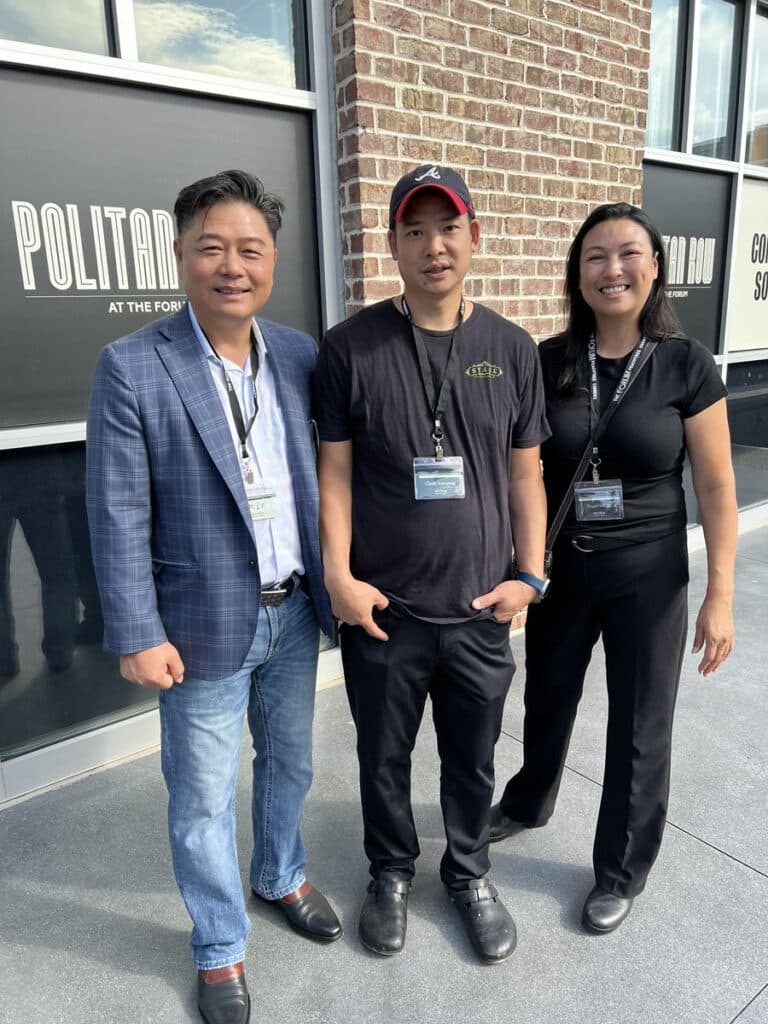
The popularity of those suburban concepts has already taken off. With Sheesh, they’re looking to do something different.
“There are going to be some things that are unique to Sheesh that you’re not going to get at the other places,” said Sunyapong. “You’re not getting a whole restaurant; this is quicker fare.”
Gekko Kitchen, a former food truck transformed into a hibachi and ramen experience, will be serving fresh, fast bowls that are more colorful and lighter than traditional hibachi fare.
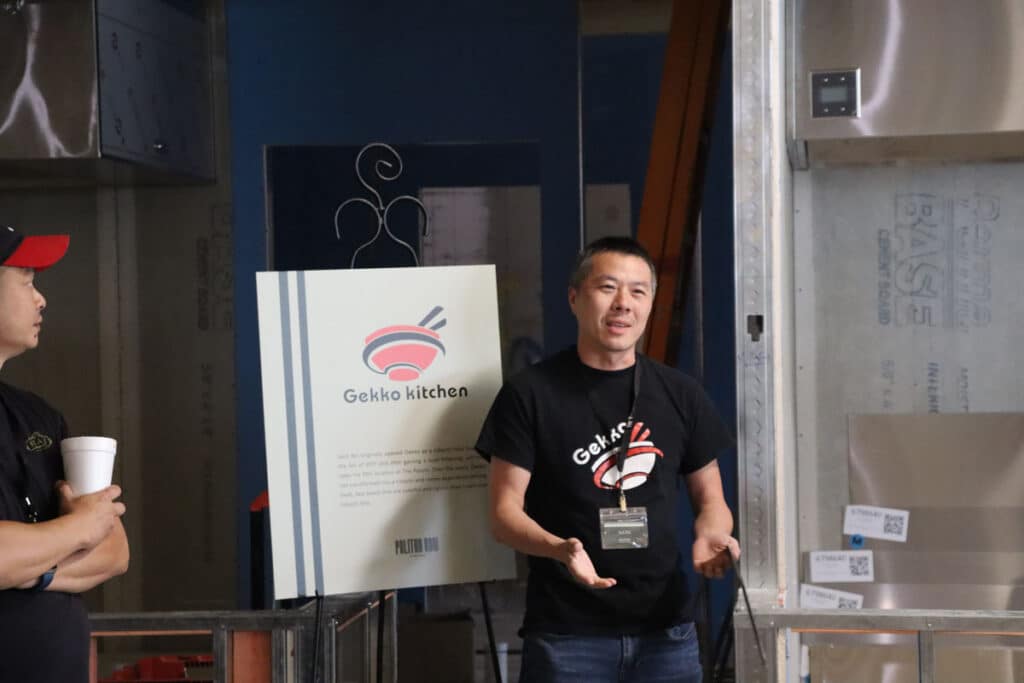
Gathering spots
Development Manager Nick Lombardo explained that NAP is moving away from building big construction projects from scratch like Colony Square in Midtown Atlanta and Avalon in Alpharetta.
“As a company, North American Properties pivoted around 2020 from building big ground-up construction to more redevelopment with already existing properties,” he said. “With the thought of great assets that just need a little more attention Infused into them to create value, we bought the Forum in 2022.”
He said that value-add propositions done at The Forum will create a more walkable center.
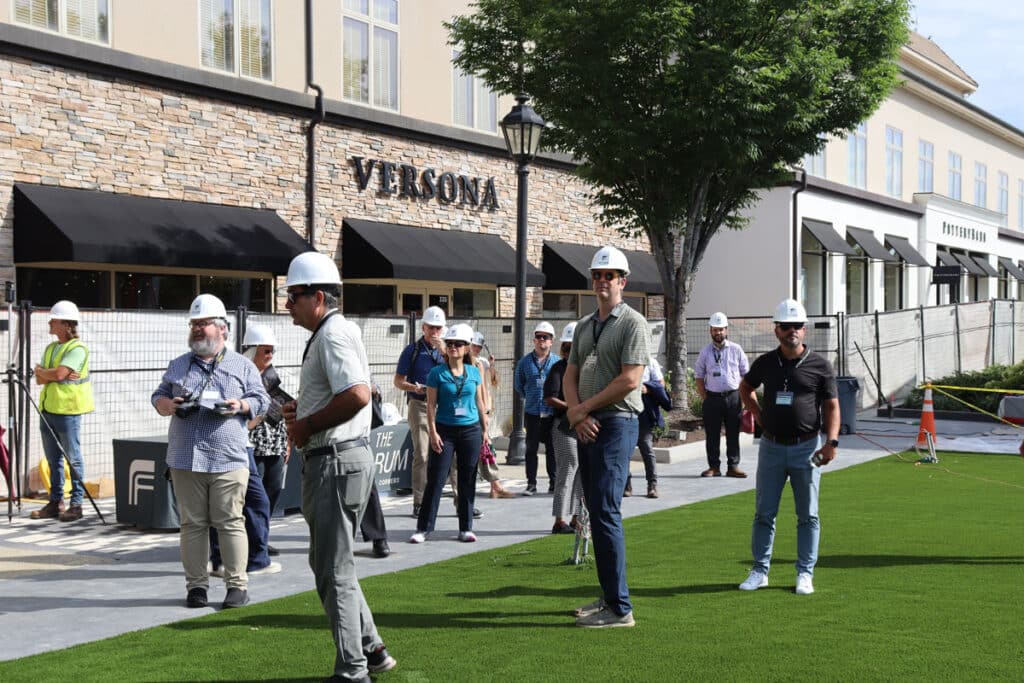
“Trying to compete with the internet on convenience is a very tough task, so the way we differentiate is by experiences,” he said. “We host between 150 to 200 events every year. We have things like concerts, wellness and fitness events and we have child playtime events. Our marketing team does a great job and they’re the differentiator when it comes to what makes our property stand out.”
By the first week of August, a large gathering space will be unveiled in the central area of the property between Pottery Barn and seafood restaurant Pêche. It will have a nine-foot LED screen capable of hosting movie nights and sports viewing. There will also be musical performances featuring local artists.
“We’re not in competition with Town Center,” said Charlotte Hinton, marketing manager at The Forum. “Town Center has gates like a real music festival and we’re more like a ‘chill and enjoy the music’ vibe where you can grab a beer and hang out or maybe kind of walk around.”
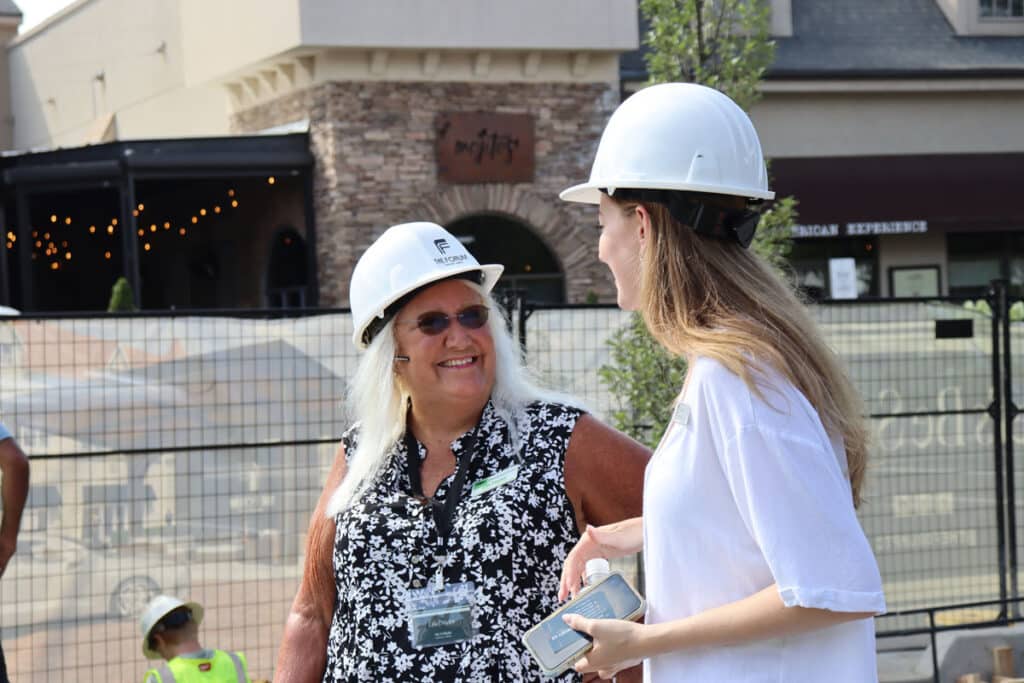
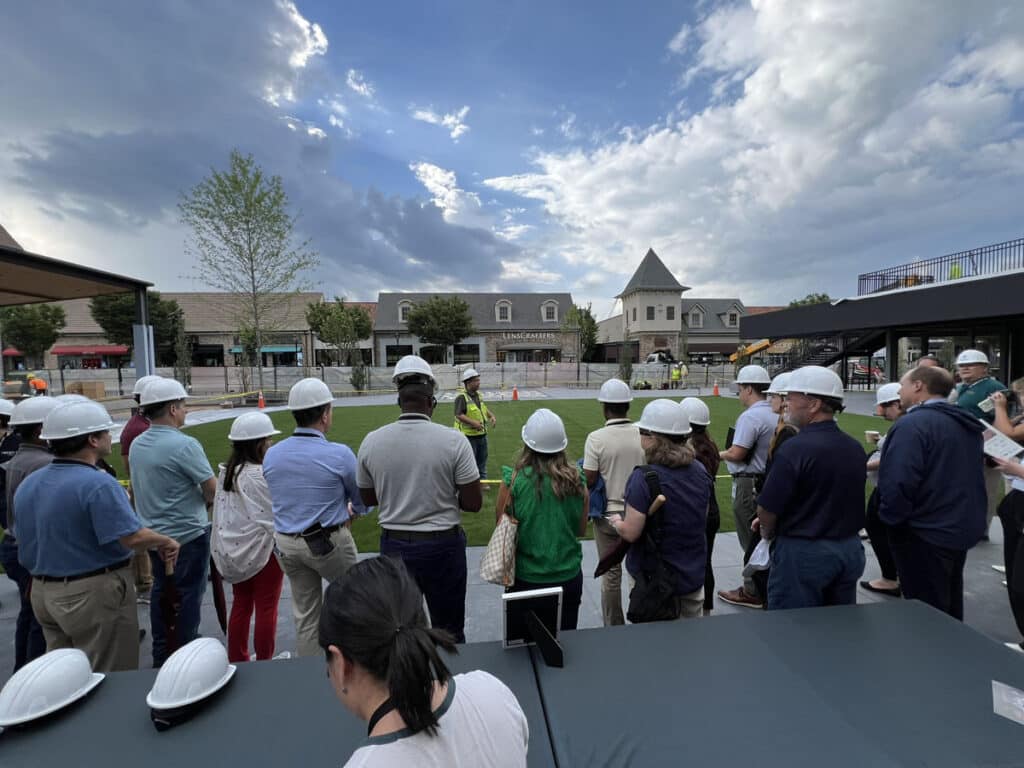
The smaller space and artificial turf are unlike the Town Center space where attendees spread blankets and bring chairs. The Forum will have furniture and seating in the space so folks can just gather and either enjoy time with family or partake in events.
The Forum will also offer valet parking on a limited schedule at that end of the property.
More improvements
Although the construction equipment will have moved out, the jewel box building will house a yet-to-be-named restaurant that will open early next year.
“We’re pretty much done with what we’re doing as far as landlord work,” said Lombardo. “We ask our tenants to bring their brand and their design and their material pallet and put that on the building to express their brand identity. They know their brand better than we do. They know how to best design their building and how it functions and works.”
It’s the same process with retail stores, he added.

“We always ask all of our new tenants to come in here when they’re building their storefront,” he said. “They’re not just selling their clothes; they’re selling a lifestyle in the brand so we ask them to push their brand out to the street.”
Even with the new spaces, there will be no shortage of parking, Lombardo added. “There’s plenty of parking behind these buildings,” he said pointing toward Pêche. “What we’ve done is enhance the connectivity to those areas. We’ve redone this breezeway and we’re adding lighting and connecting the parking lot to the main boulevard here. The goal is to replace cars with people and activity and bring a sense of community to the property.”
Related
Business
Taste of Peachtree Corners: PCBA Showcases Local Restaurants
Published
1 week agoon
July 17, 2024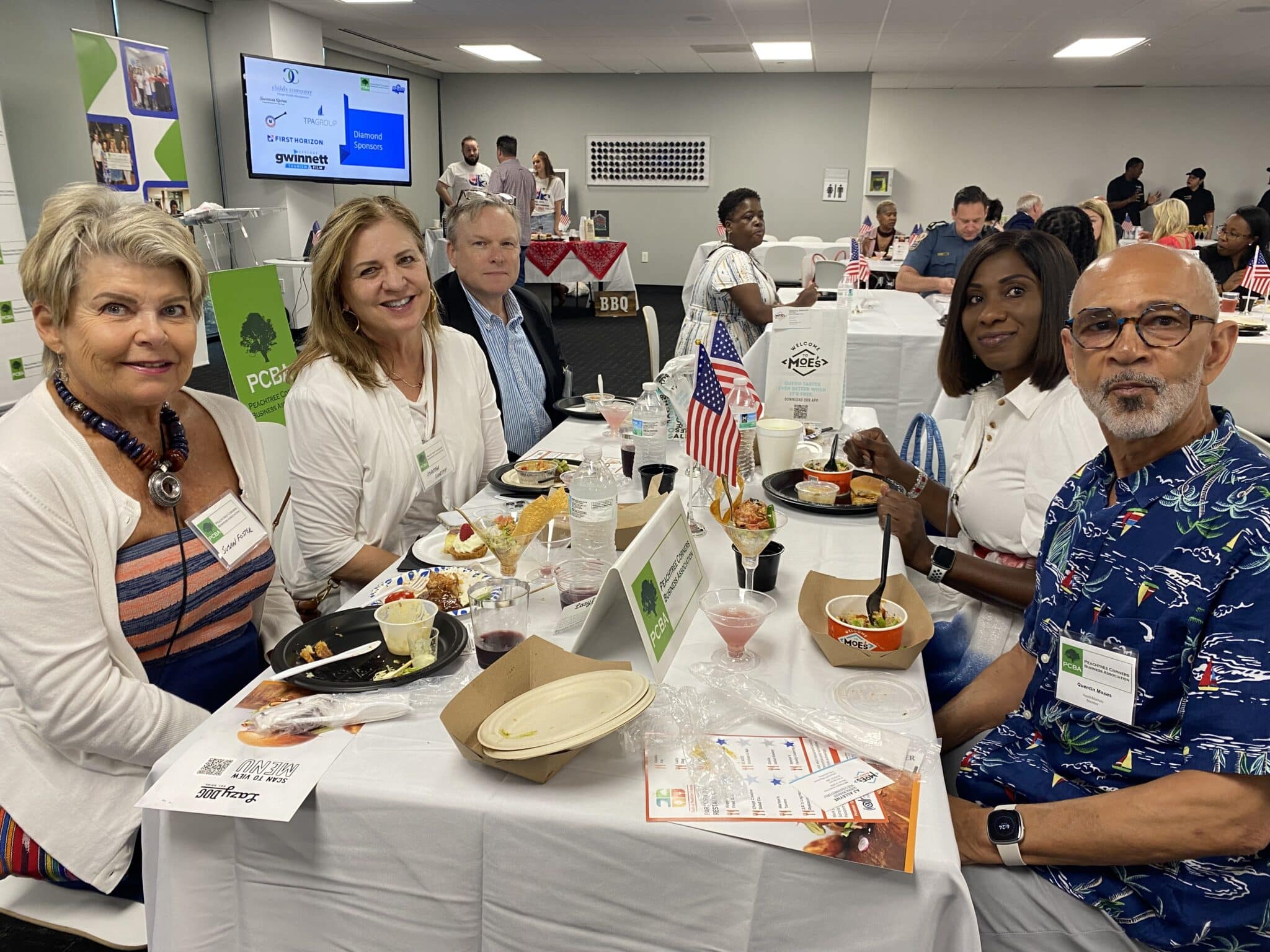
The Taste of Peachtree Corners has been in the works for years, but the COVID-19 pandemic put many key events on hold for the Peachtree Corners Business Association (PCBA).
But luckily this year, the dedicated staff of volunteers successfully executed a memorable event and introduced a lot of local business owners to their neighboring restaurants and caterers.
As I walked up to the Community Chest Room at Peachtree Corners City Hall on June 27, there was a line outside the door. I later found out that over 100 people had registered to attend the event. I got checked in quickly and was faced with a “passport” of 10 Peachtree Corners restaurants serving everything from high-end bakery items to good old-fashioned barbecue, and modern twists on seafood and American cuisines.
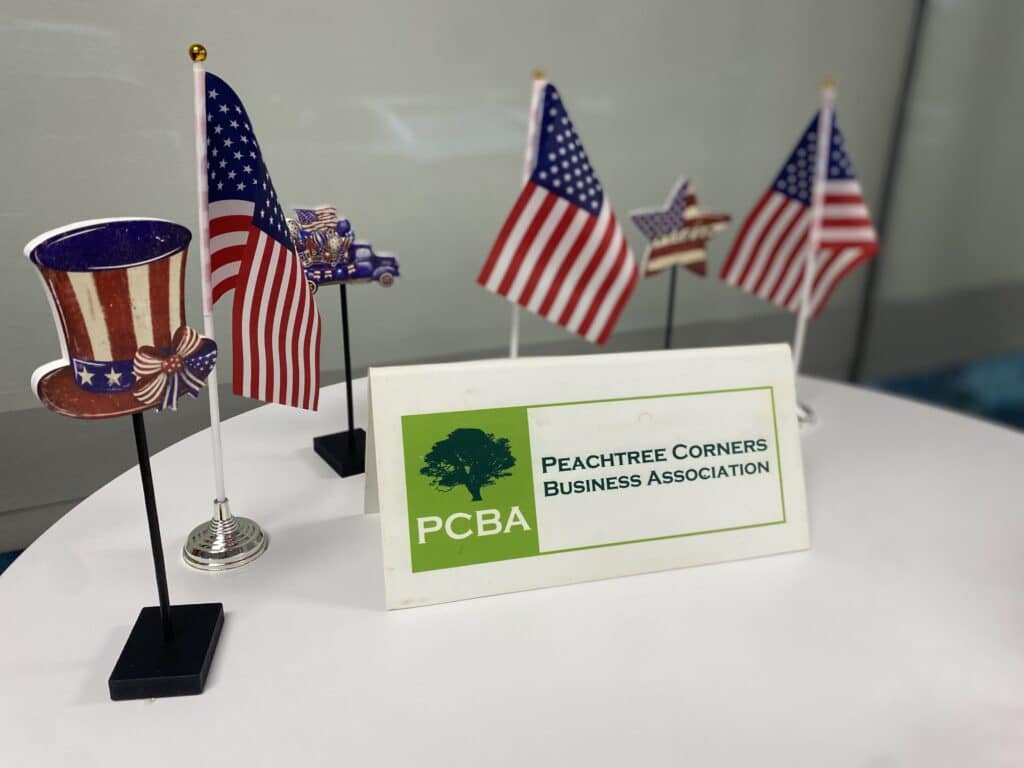
Let’s talk about the food
The idea was to visit all 10 restaurants and collect stars while trying samples and small plates. My first stop was Firebirds Wood Fired Grill, and they had my favorite – homemade chips and queso. The queso was smoky and mildly spicy with a great depth of flavor. What a great start. Next up was Chopt. Creative Salad Co. I had never heard of this restaurant before, but they blew me away with a perfect amuse-bouche of cherry tomato, pesto, mozzarella, and olive oil. These guys understand simple and fresh Mediterranean flavors.
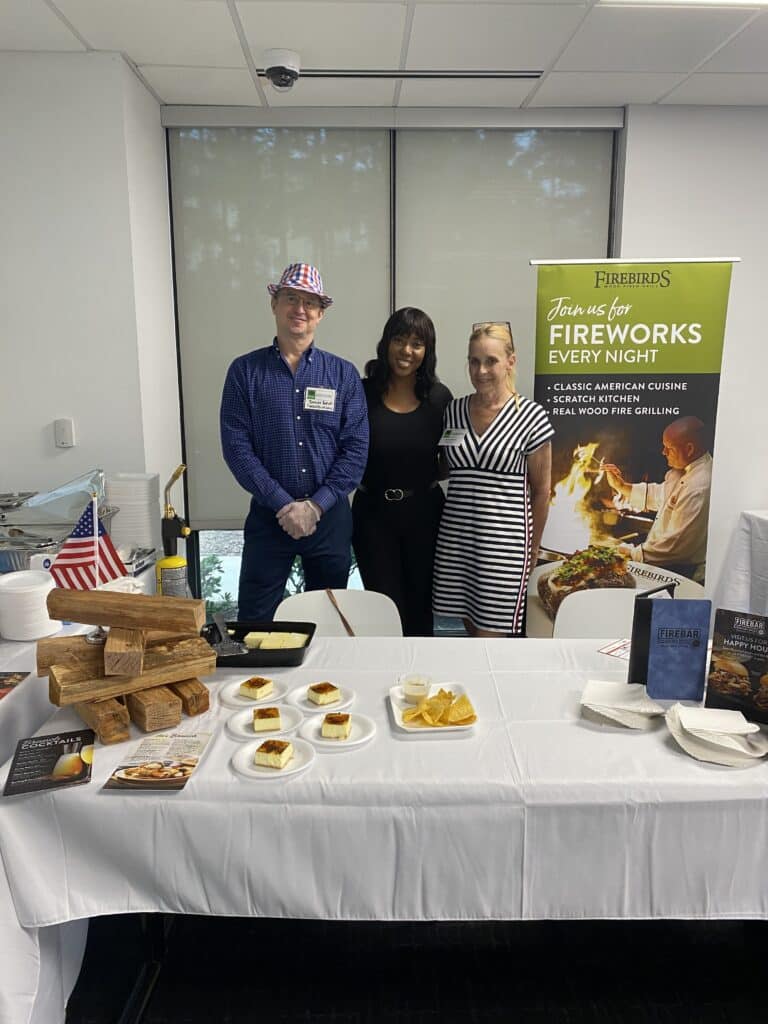
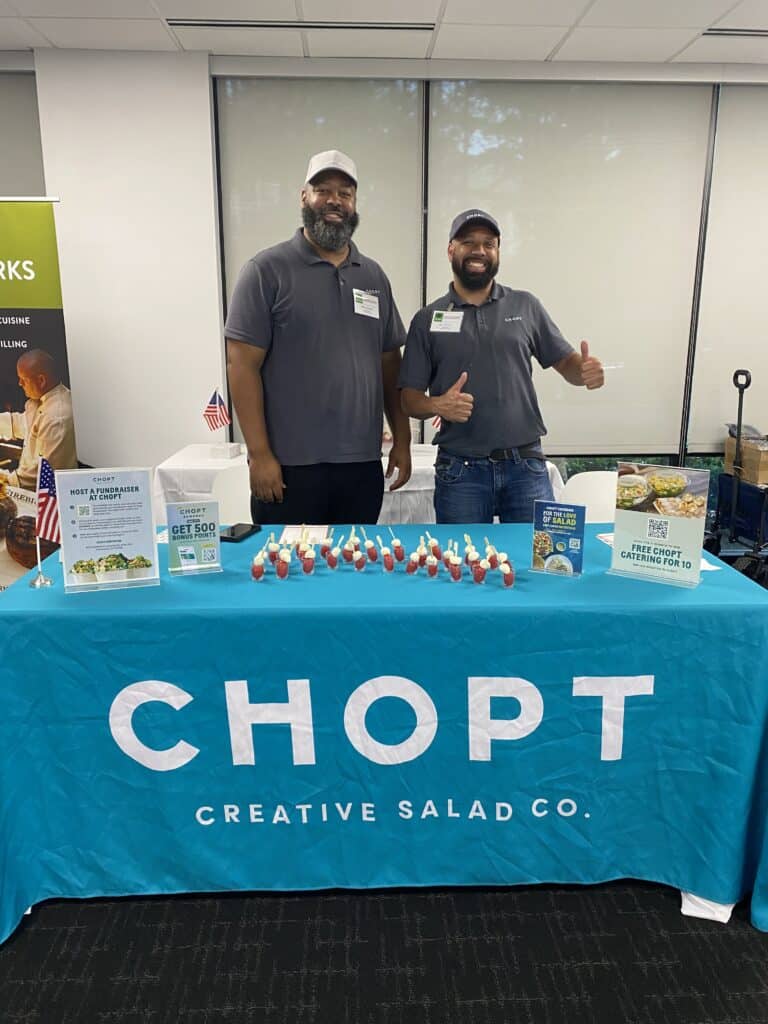

The folks from Marlow’s Tavern were also on-site serving shrimp and grits with jalapeno, spinach and tomato beurre blanc. This is definitely the style of elevated food I’ve come to expect from Marlow’s. And as a nice touch, they prepared a refreshing blueberry cocktail.
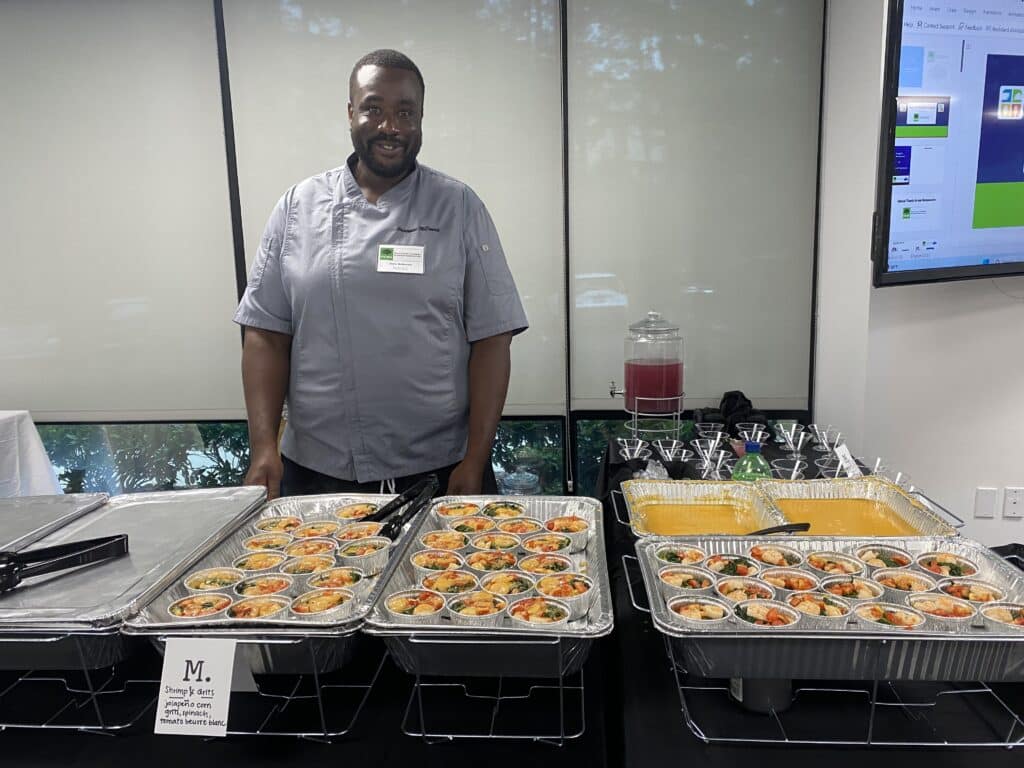
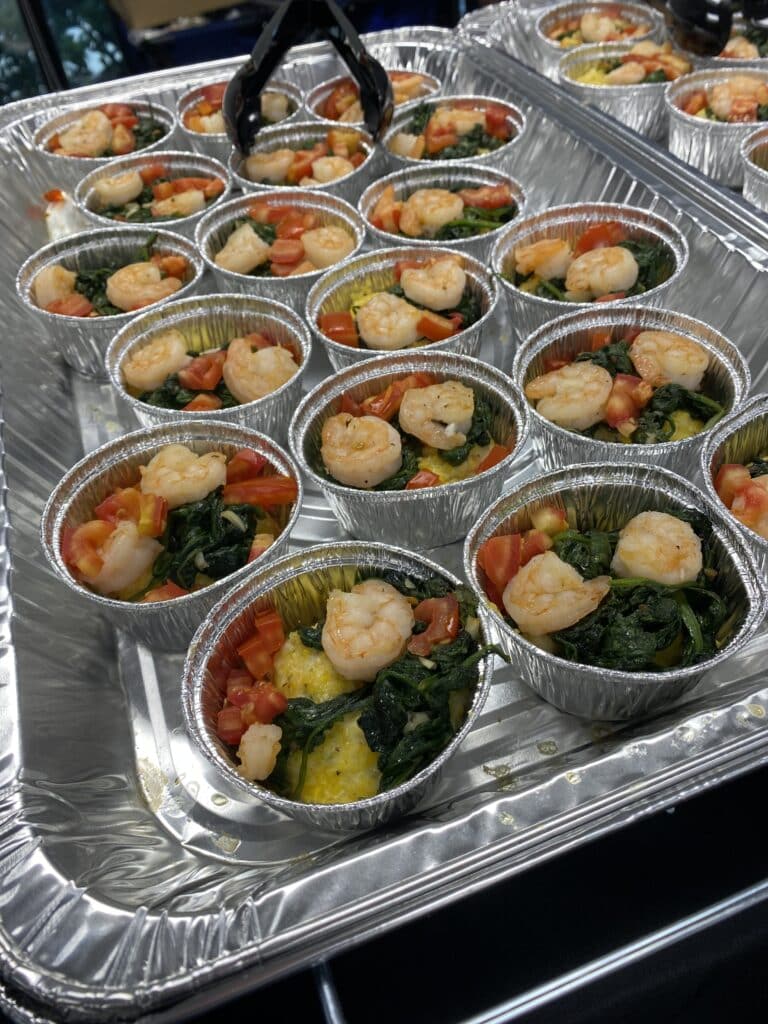
Another familiar face was set up on the other side of the room. J.R.’s Log House Restaurant served southern favorites like pulled pork sliders, baked beans and mac n’ cheese. I couldn’t pass this one up. The pulled pork was tender, tangy and saucy. Exactly what I want from a barbecue. Lazy Dog’s table really impressed me with its presentation. The tuna cup with rice, avocado and chili with chips on the side, was a real stunner.
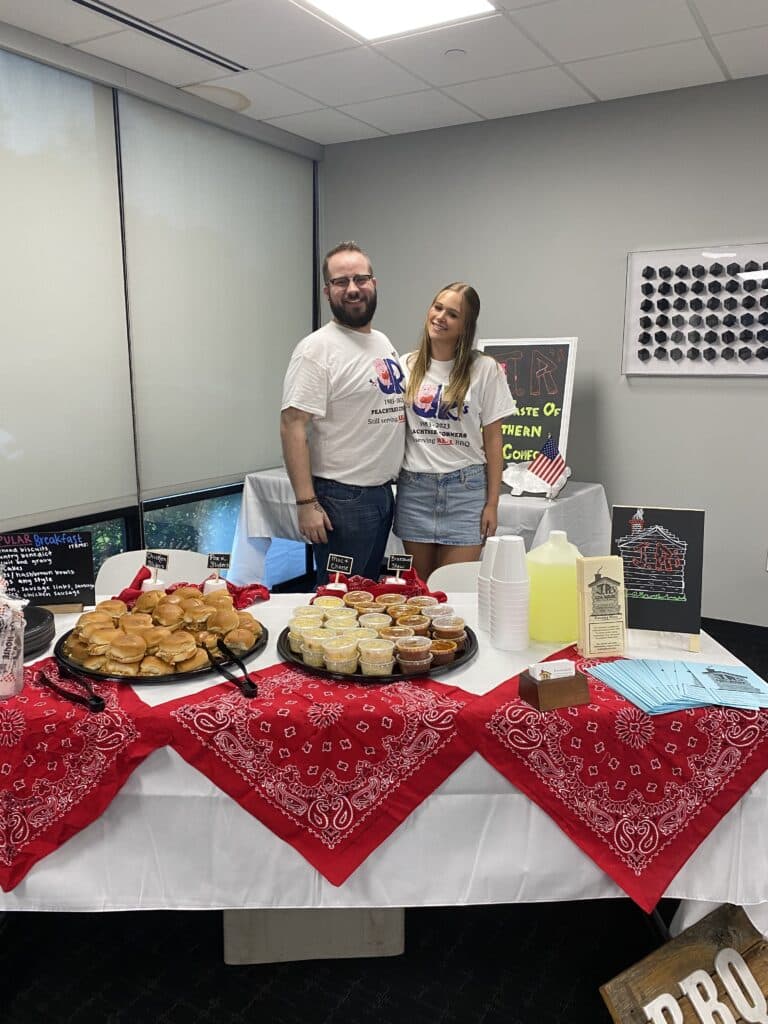
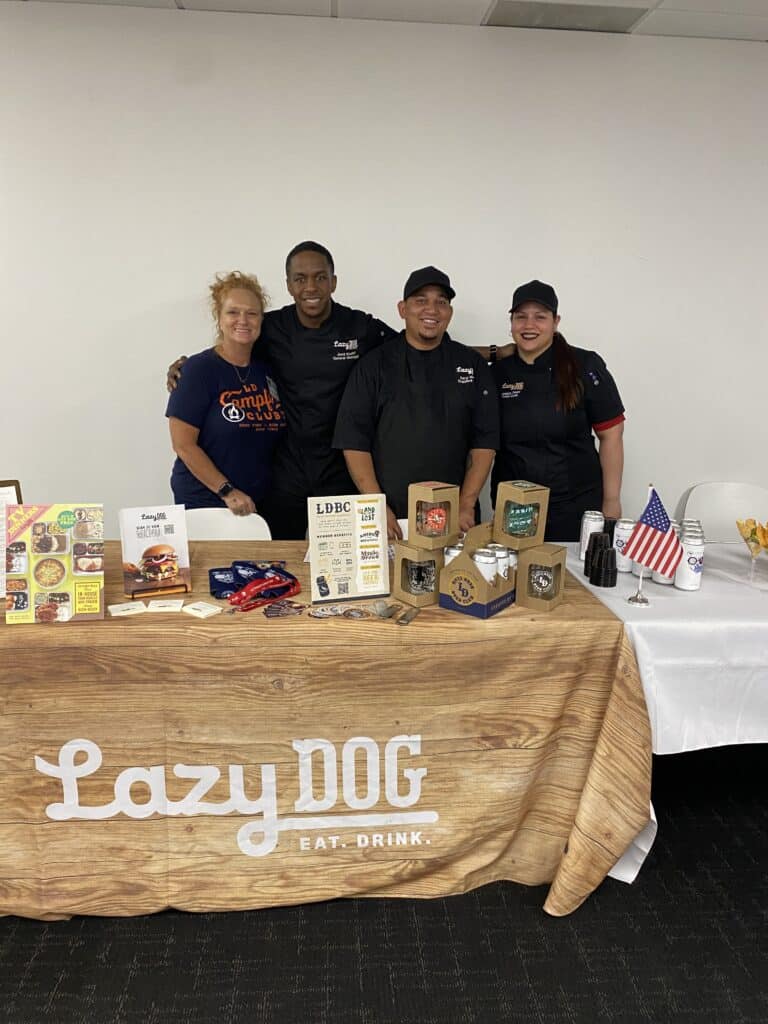
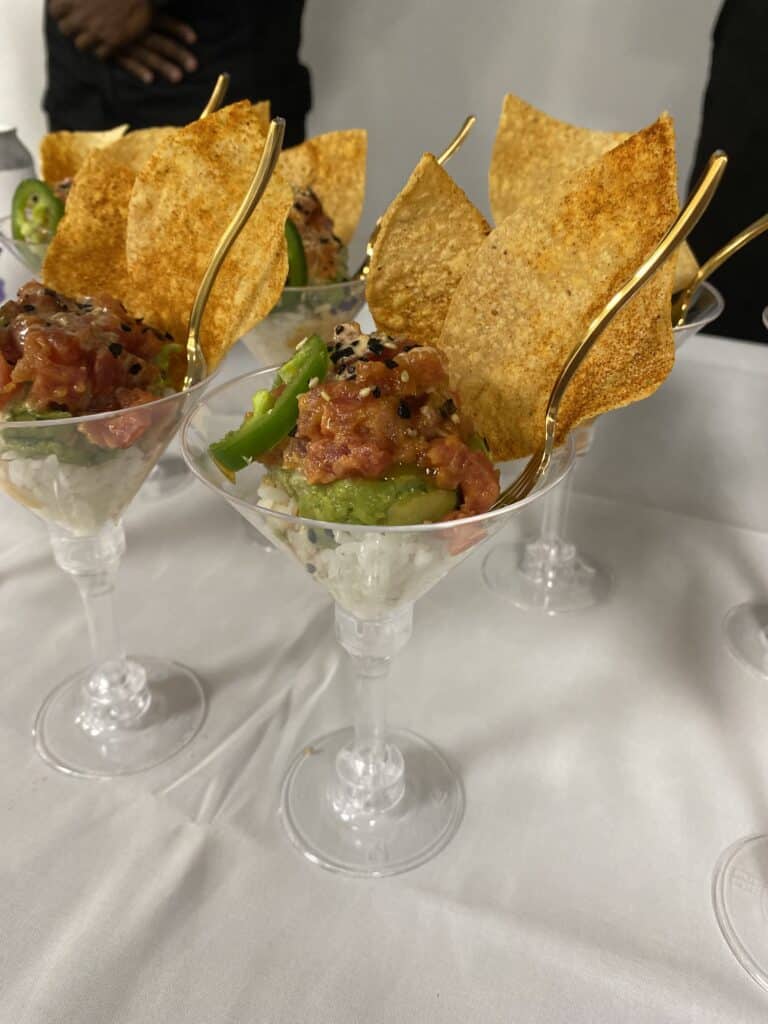
Moe’s Southwest Grill was also on-site handing out tasty tequila lime chicken with rice, avocado, and black beans. This super hearty and comforting entrée was followed by a seafood course from PECHE Modern Coastal. Crab cakes with a croissant pinwheel, roasted garlic and lemon aioli and arugula were on the menu and the flavor combinations were simply fantastic.
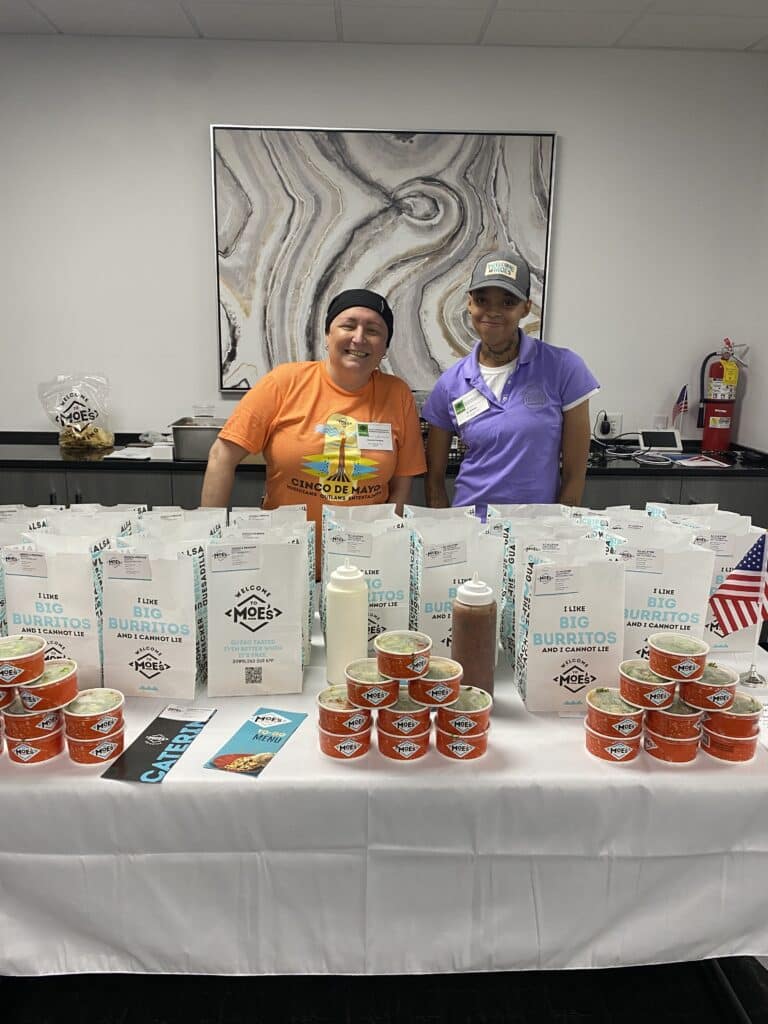
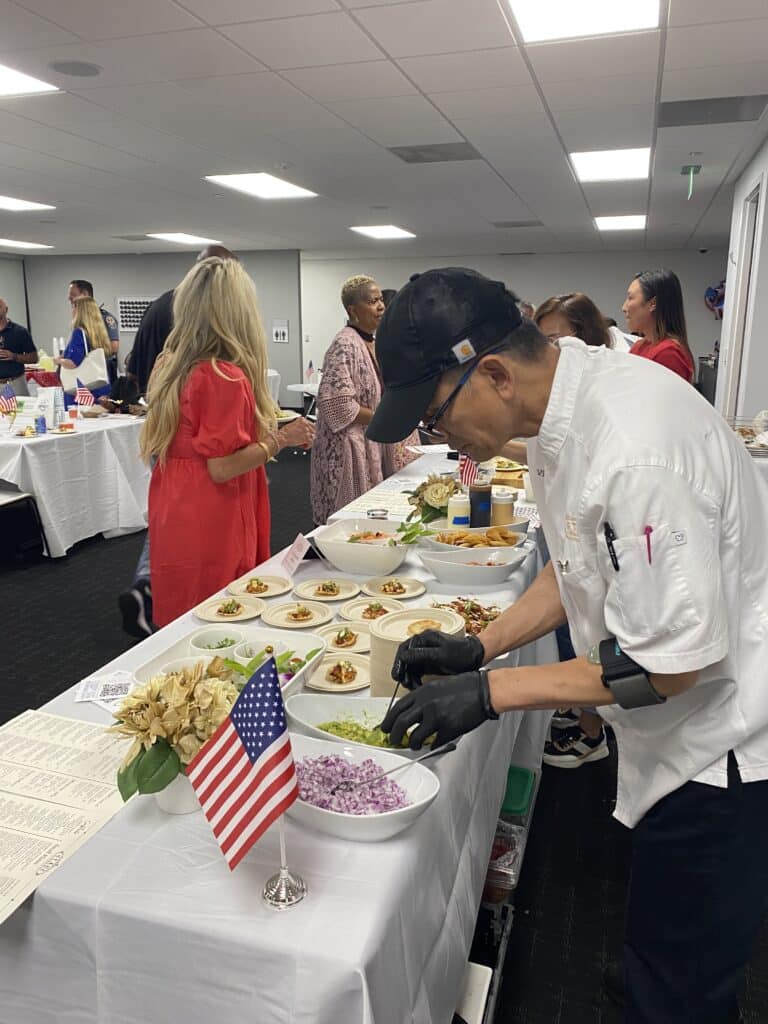
PECHE’s sister restaurant STAGE Kitchen & Bar was next door offering a tuna and salmon tostada with avocado, eel sauce, spicy mayo, and cilantro. This was easily one of my favorite bites of the night. The tostada was crunchy and light with clean and bright flavors. No kidding, I could probably eat this every day for lunch.
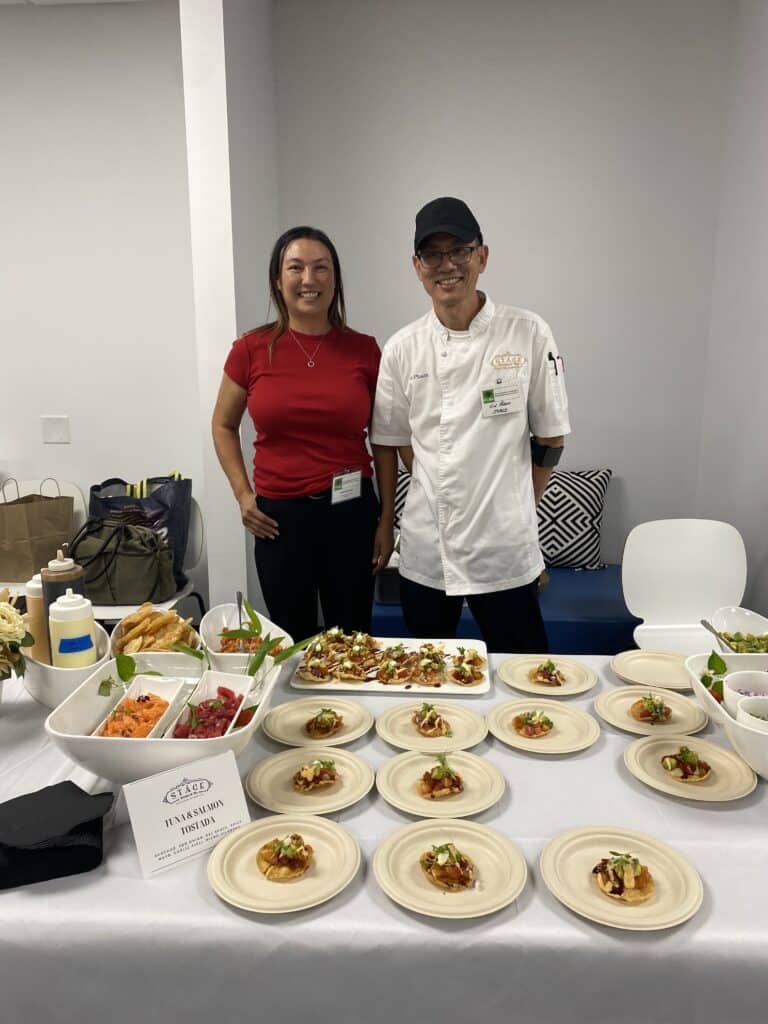
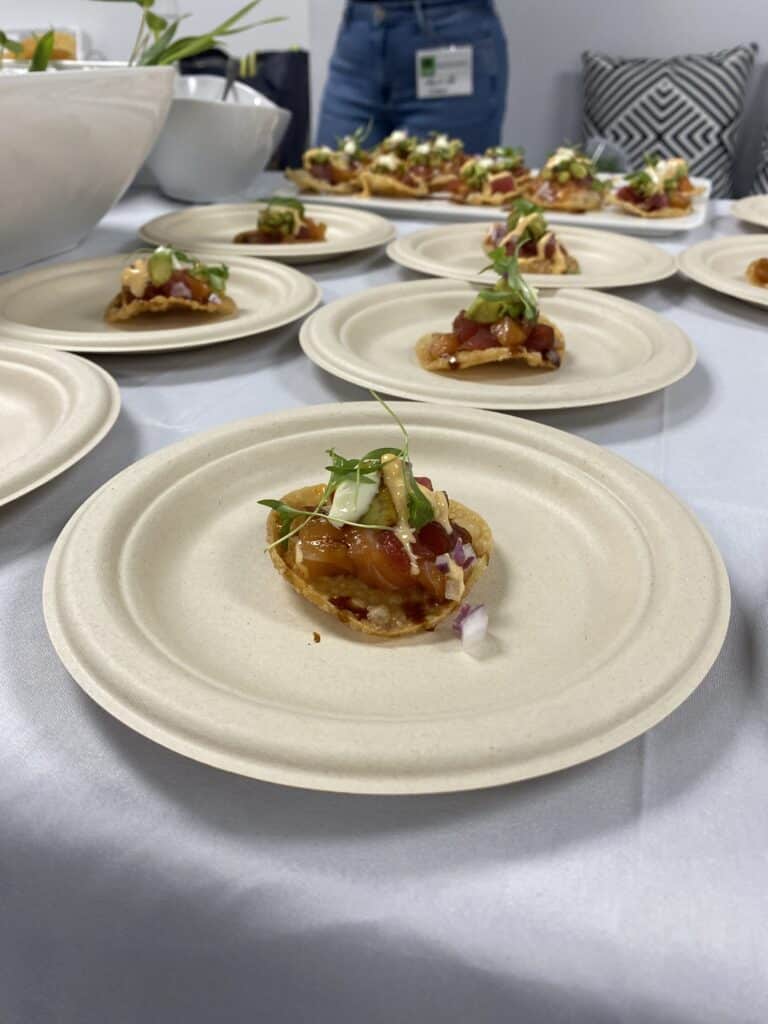
I moved on the Smoke’s Family Catering and owner Phillip Smoke had whipped up enough barbecue to feed an army. I had the pleasure of trying the smoked chicken with potato salad and it was the perfect pairing. Last but not least: dessert. I capped off the evening with a beautiful chocolate ganache-filled croissant with perfect lamination and flaky texture.
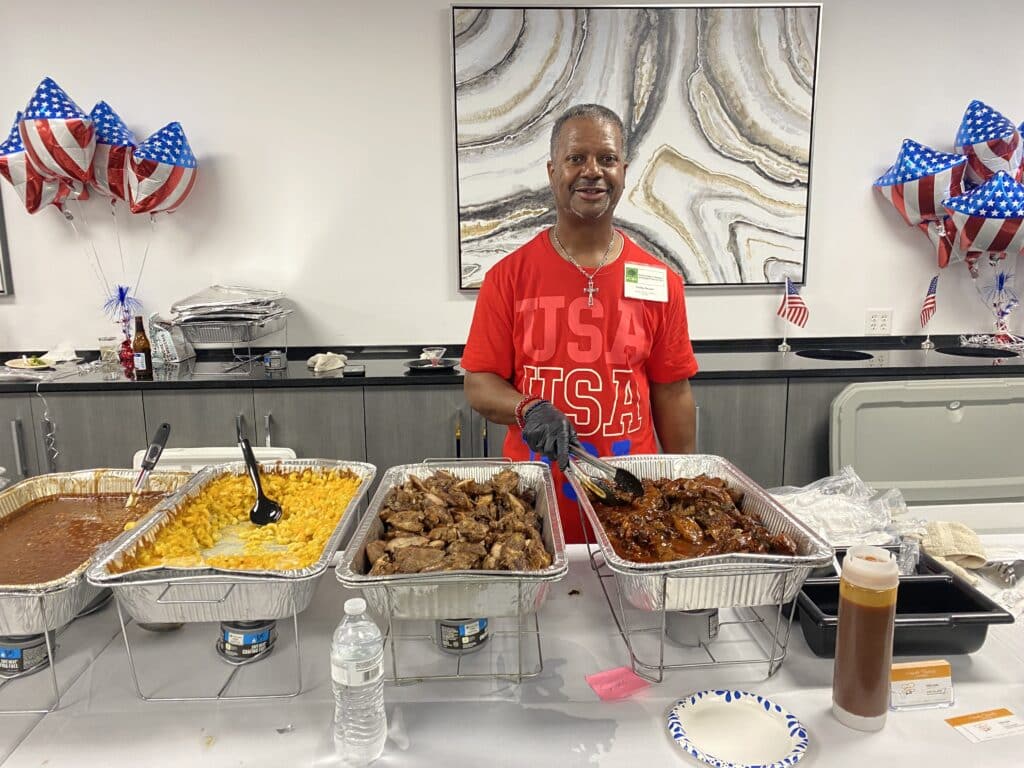
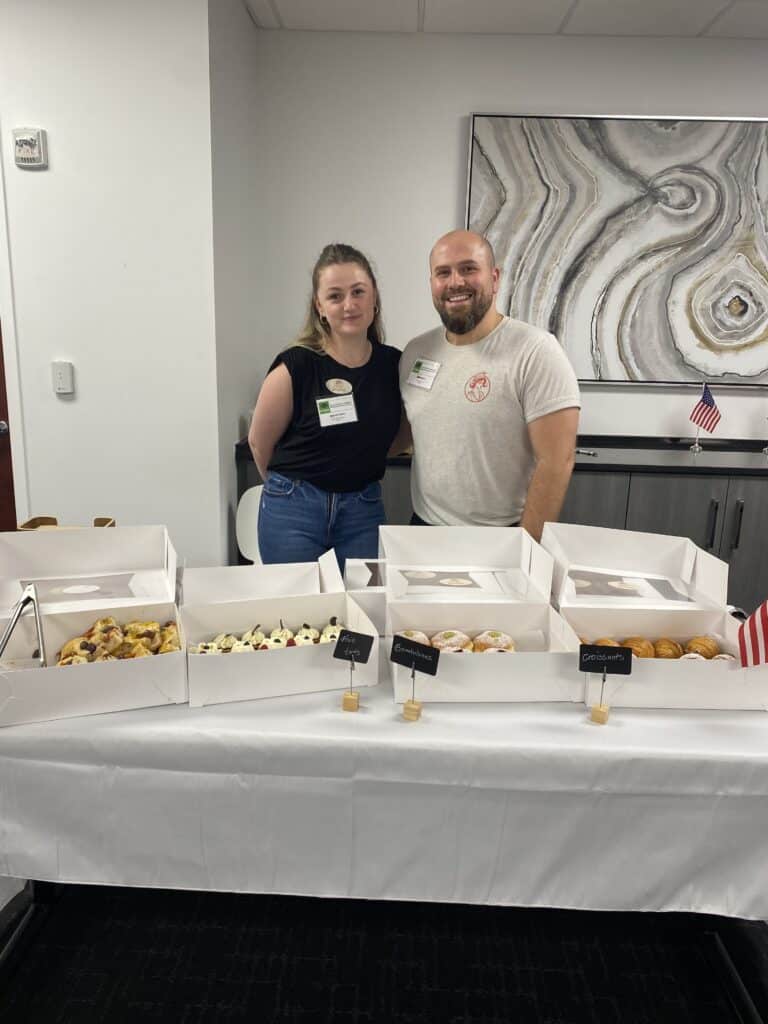
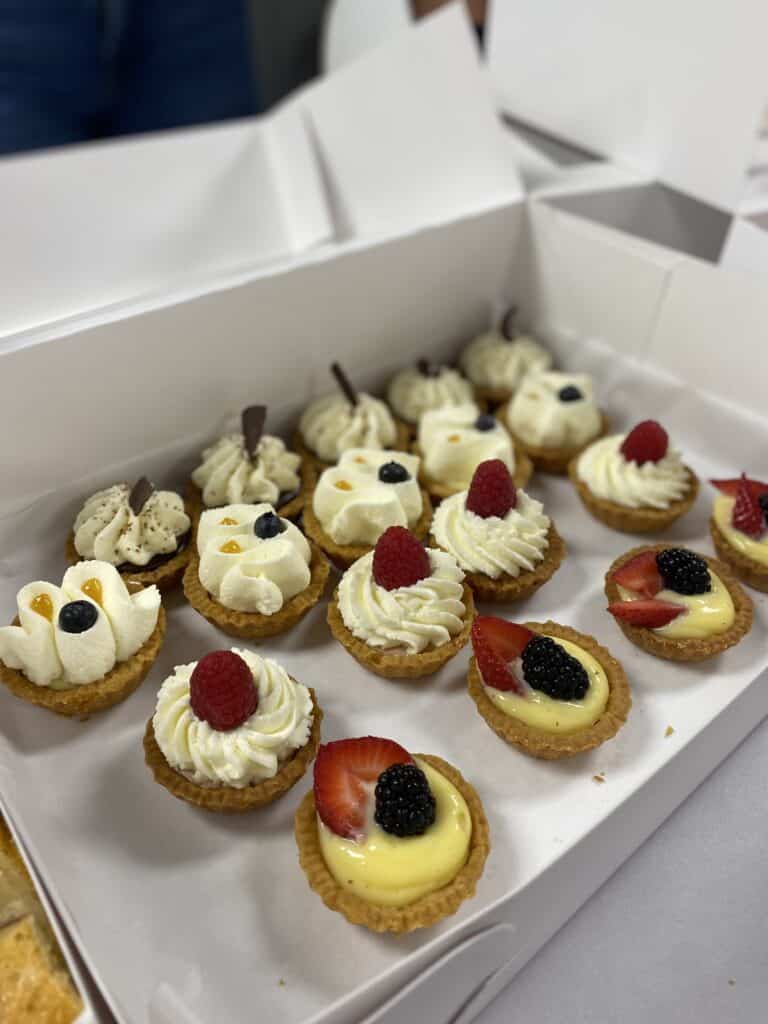
The inspiration behind the event
With a (very) full stomach, I caught up with PCBA President Lisa Proctor to talk about the event.
“We knew that COVID was really hard on a lot of our restaurants to get people back in,” said Proctor. “We wanted to do it in June because we wanted to celebrate our military. Everybody remembers them maybe on Memorial Day or different things, but June is the 80th anniversary of D-Day.”
“The military is always close to our heart,” she added. “We’re also very proud of our restaurants. They all have gone above and beyond.”
Tonight, the PCBA was honoring the Armed Forces and its brave veterans while bestowing two donation checks to very worthy causes.
The first check for $500 went to Folds of Honor. Since 2007, Folds of Honor has provided life-changing scholarships to the spouses and children of America’s fallen or disabled military. And now, their mission expands to the families of America’s first responders.
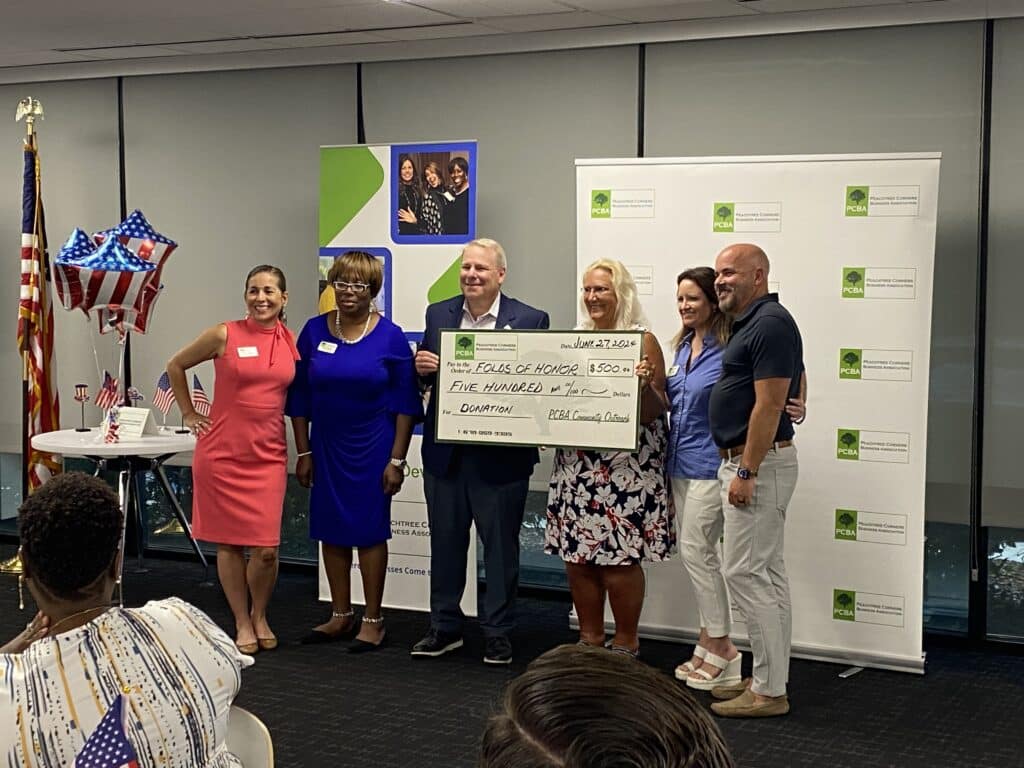
The second check for $500 was given to Light Up the Corners, a 501(c)(3) volunteer organization with an annual glowing, flashing, blinking, shining, nighttime running party and fundraiser in one. All proceeds from the event go to benefit less fortunate children and families in the Peachtree Corners community who are struggling by giving them the chance to participate in life-enhancing programs and activities at the Fowler YMCA.

Over the past 12 years, the PCBA has awarded 19 scholarships and donated more than $156,000+ back to the Peachtree Corners community.
Related
Business
Local Resident Opens AtWork Location in Peachtree Corners
Published
2 weeks agoon
July 10, 2024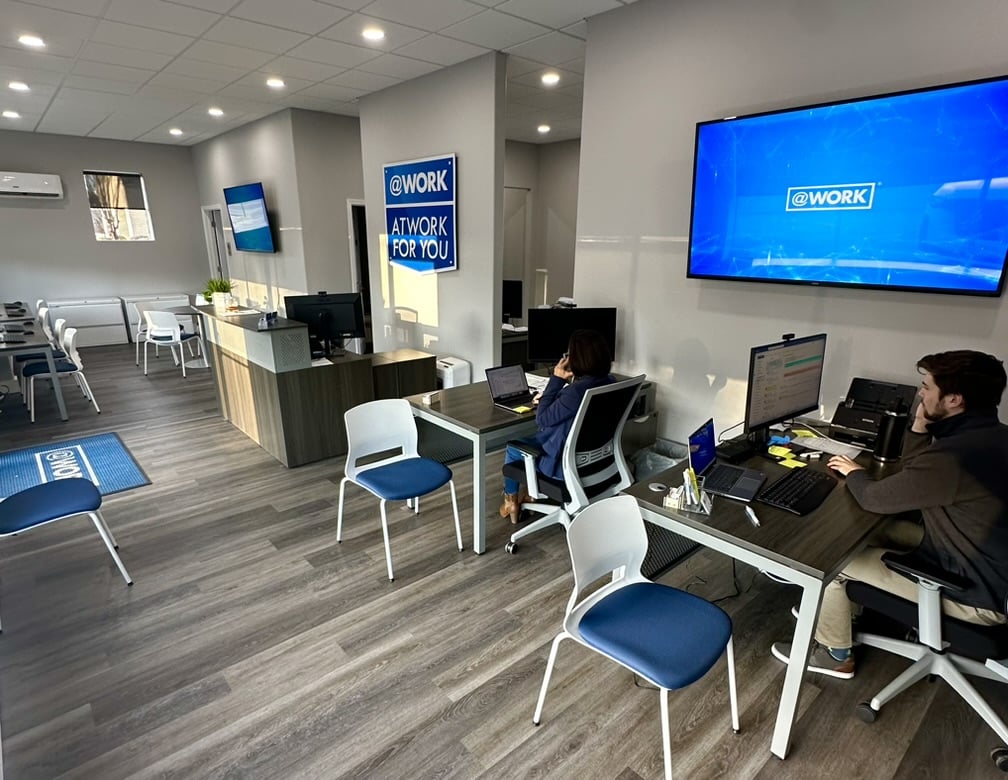
AtWork, one of nation’s leading staffing franchises, has opened its third Metro Atlanta location in Peachtree Corners, Georgia at 6185 Buford Highway, Suite E-100.
AtWork Peachtree Corners is locally-owned by Kamal Bhatia, an immigrant from India with decades of experience in hospitality and as the Senior Vice President of Operations of Atlanta-based Action Bartending School.
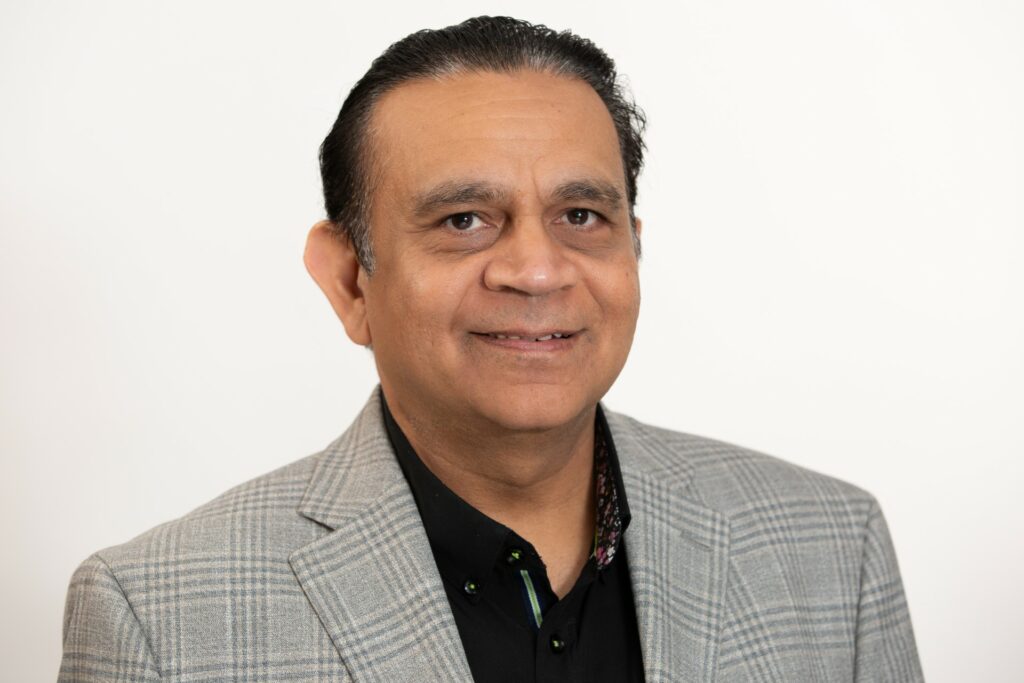
“There is an incredible need for AtWork’s services in Peachtree Corners,” said Bhatia. “Since migrating here in 1996, I’ve witnessed Atlanta evolve and sprout new communities north of the city, including my own. Peachtree Corners has become a hub for thriving businesses, and my goal with this location is to be a key resource between companies and job seekers to support the continued growth of our local economy.”
Bhatia’s son and daughter will assist him in the business.
“This is an opportunity to create a legacy company to ensure our community is supported for generations to come,” he said.
For more than three decades, AtWork’s mission has been to connect people with jobs and jobs with people. With more than 100 locations nationwide, AtWork puts nearly 40,000 individuals to work each year in administrative, light-industrial, accounting and finance, hospitality, IT and management-level positions at some of the nation’s largest and most recognizable companies.
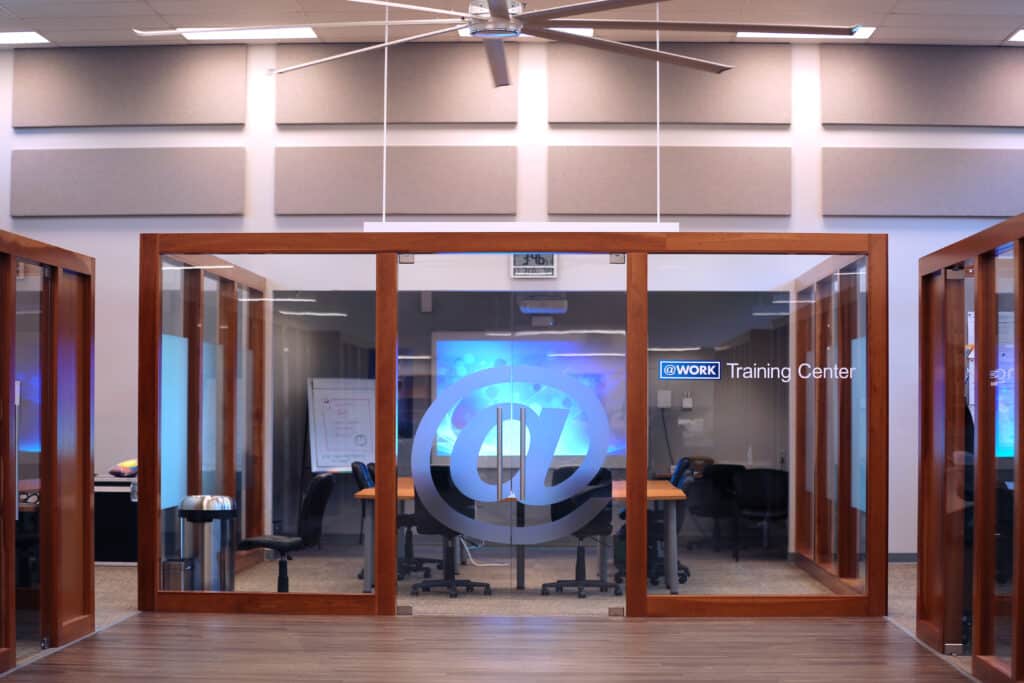
“We’re proud to open our doors in Peachtree Corners and provide a common place for both job seekers and growing businesses to turn for staffing solutions,” said Jason Leverant, President and COO of AtWork.
“AtWork will serve as a key resource to help employees thrive, businesses prosper and communities flourish. Kamal is the perfect partner to champion our mission and be a servant leader in her local community,” he added.
Related
Read the Digital Edition
Subscribe
Keep Up With Peachtree Corners News
Join our mailing list to receive the latest news and updates from our team.
You have Successfully Subscribed!

What’s going on at Jones Bridge Park and the Challenges of Urban Development

Taste of Peachtree Corners: PCBA Showcases Local Restaurants

The Forum Gives Sneak Peek of New Eateries and Community Spaces

Southwest Gwinnett Mayors Share Visions for the Future

8 Events Happening In and Around Peachtree Corners This August

Peachtree Corners Shines Bright with Light Up the Corners Glow Race this August

Peachtree Corners Shines Bright with Light Up the Corners Glow Race this August

The Forum Gives Sneak Peek of New Eateries and Community Spaces

8 Events Happening In and Around Peachtree Corners This August

Southwest Gwinnett Mayors Share Visions for the Future

Taste of Peachtree Corners: PCBA Showcases Local Restaurants

What’s going on at Jones Bridge Park and the Challenges of Urban Development

Local Resident Opens AtWork Location in Peachtree Corners

CHRIS 180 Expands its Services into Gwinnett County [Podcast]

Light up the Corners [Video]

Capitalist Sage: Business Leadership in Your Community [Podcast]

Cliff Bramble: A Culinary Adventure through Italy

Top 10 Brunch Places in Gwinnett County

A Hunger for Hospitality

THE CORNERS EPISODE 3 – BLAXICAN PART 1

Top 10 Indoor Things To Do This Winter

The ED Hour: What it takes to Remove Barriers from Education
Peachtree Corners Life
Topics and Categories
Trending
-
Business1 week ago
Taste of Peachtree Corners: PCBA Showcases Local Restaurants
-
Business2 days ago
The Forum Gives Sneak Peek of New Eateries and Community Spaces
-
City Government4 days ago
Southwest Gwinnett Mayors Share Visions for the Future
-
Around Atlanta4 days ago
8 Events Happening In and Around Peachtree Corners This August







